#carl jung's 4 archetypes
Text
Pick a card ~ What's your archetype + your storyline

Hey guys, i wanted to do a reading that illustrates your current life situation through the lenses of archetypes and storytelling. today, you have three piles to choose from; your reading will tell you what archetype you are embodying at this moment and the specific storyline that may play out in the context of this archetype.
An archetype is a recurring symbol or motif throughout literature and media. it's the primordial mental image inherited from our ancestors that categorize people into vague ideas or concepts. According to Carl Jung, an estabkished psychologist and psychoanalyst, it's said that we all have a collective unconscious understanding of all these archetypes that we can tap into for various purposes. for example, if you've ever heard of the ''shadow self'' then you've already encountered a Jungian archetype, this archetype is meant to help us confront deeper, hidden parts of ourselves that we tucked away.
One single archetype may not describe you perfectly, as archetypes can be dynamic and ever becoming, so let this reading be a soundboard for your own personal understanding of who you are and where you're going.
heres info about getting a reading from me: services
PILE ONE
your archetype- the nine of pentacles ''the independent woman''
this card portrays the archetype of a feminine who is self-reliant, independent and enjoys their own company. you do not have to be a woman for this archetype to apply, as archetypes describe ideas and motifs, not specific genders. this archetype also exudes a sense of inner peace and contentment: a person who embodies this archetype knows how to find the beauty around them, they know they can rely on themselves to provide stability and success through their own hard work. this archetype values autonomy, aesthetics, hard work, and solitude.
Your story line- 7 of pentacles, the fool, 4 of swords, judgement
your storyline is fixated on patience and waiting, at this point in your life you may feel that you're in the phase of growth and harvesting your wealth and abundance all around. You may feel you're on the ''brink'' of something taking off, I feel that your purpose deals with your ability to grow and assess yourself for progress. I feel like you're in the part of the story where the protagonist is experiencing frustration, they feel like they have put in the work but have yet to see substantial results from what they have done. you feel that you put in the work, you should see that manifest in the real world. your archetype is being moved in the direction of taking a leap of faith, of trusting the process blindly even though they dont know whats going to happen. you're the protagonist who places more faith what they can see rather than what they can sense, you're frustrated because you want to see results in the physical instead of trusting that movement is already happening behind the scenes. for you, having faith is the recurring lesson and momentum of your storyline. the climax of your storyline is represented by the 4 of swords. the 4 of swords is regularly a mundane card of rest and reflection, but for you, this is the cultivating event that occurs. as the hardworking, independent, self-reliant archetype, learning to take a break and reflect on where you are internally instead of trying to make movement happen in the physical world will feel very disorienting. its not so hard for you to be in solitiude, but to take a breather from pursuing goals and action is the hard part, and that precisely what i see as the climax of your storyline. taking time to reflect on yourself and go within the avenues of your mind is the inciting event, taking a break from movement will harden your sotryline into place. The conclusion or resolution of your storyline is represented by the judgement card. i feel this is a realization, a revelation that awakens you on a spiritual level. the momentum behind your storyline was learning to have faith, to trust the process despite not seeing evidence in the physical world. so i feel the ultimate conclusion for your protagonist is a spiritual or philosophical awakening. you will reach a higher level of understanding that allows you to contextualize your growth beyond what you can see. you will achieve a revolutionary understanding of yourself and of your growth.
PILE TWO
your archetype- ace of wands, the element of fire/ the seed
ok, for this pile. you are not honed into one archetype but rather an energy, or potential. you're characterized by the element of fire and smoke, you're chronically at the start of something new and you're at the start of realizing your own light. you're seed at the root of life. to be specific, you're the archetype of someone who can't be placed in a box or tamed by one image or phrase because you simply the potential, the energic seed. you cant be conceptualized, and perhaps your experience a feeling directionless in your life because of this. as the element of fire you have the option to destroy or enlighten. you can impassion or burn. its up to you.
your storyline- justice, 8 of cups, 9 of swords, knight of cups
your storyline is characterized by fairness, equity and making big important decisions about your life path. as someone who is simply the archetype of fire, of raw potential, your storyline is to make a choice of where you want to go on your path. but this choice is an important one and dictates the course of your life. the lesson you ultimately learn as the protagonist is when to move on and release certain things. truth and integrity is something you strive for on a deeper level, so making fair, descions based on clairty is something you value, so I feel like on your path, you will encounter the choice to leave something behind or to detach emotionally many times. this will be very difficult for you, but this theme of choosing when to leave and when to detach will be a recurring theme throughout your life. learning what your path is and taking action to stay committed to this journey is the lesson. and this choice will be a Indepth process of weighing out the pros and cons, of trying to do the right thing thats fair to yourself and other's. the climax of your storyline is represented by the nine of swords. this will be a very mentally choatic or active climax, and it will involve extreme anxiety and overthinking. ultimately however, your resolution is represented by the knight of cups. learning to lead with your emotions and to trust your intuition will be the ultimate outcome for you as the protagonist. trusting yourself with your own emotions and going with your instincts when it comes to what your path should be is the direction you are going.
PILE THREE
your archetype- the page of swords - young messenger, the spy.
the page of swords is young, open minded, smart, alert and very curious about their environment. traditionally speaking, the page of swords has been associated with the archetype of the spy; someone who can adapt to their surroundings and gather information as quickly as they can pass it on. you dont spy on people per say, but you do watch and observe others, you may act as a intermediatory between people for their communication, you're curious about the world and new ideas spiral around your mind like little nats. You're the archetype off someone enjoys mental stimulation, and you know how to find that stimulation in unconventional ways or without needing to actively engage with others all the time. You're alert of you're surroundings, details matter to you and you notice things other people don't because they're not quiet enough to pick up on it. You're the archetype of someone in their mind alot, soneone who may overthink or over analyze
Your storyline- the devil, death, 3 of wands, page of wands
You're in a place right now where you feel bondaged, stuck or held back. You may feel that there's hierachal or manipulative forces at play that are creating a shadow over your life, you may feel like there's not a lot of room to move around and do what you want because of illusions of control. This is the part of the story where the protagonist feels like a victim to their circumstances and they don't know how to wiggle out of them. However, im seeing that the lesson here is represented by the death card, which means the lesson you're learning is transformation. You're learning to release what doesn't have power over, illusions, and stagnant situations throughout your life. Death is a very humbling thing, the only thing we can take with us in death is ourselves. When you die, everything you've worked for will be dirt, and all you have is the core of your being You're overall lesson in the story is to release all the bondages snd attachments to things that aren't really apart of who you are. The climax of your storyline is represented by the three of wands. This tells me that the peak of the story arch is you moving, going new places, exploring and expanding past your comfort zone. The climax here is you taking action and experincing conplete freedom, going past boundaries and seizing new territory. The illusions and restrictions you experience mentally correspond to you're enviroment, you're the archetype of someone who is mentally stimulated, so when your enviroment is dull, restrictive and grey, you also feel like what's possible for you to equally restrained. When you release bondages to your ego, illusions of control and allow transformation to occur naturally, you reach new horizons. And I feel you may initiate alot of transformation through moving and traveling. The conclusion to your story arc is that of the page of wands, the page of wands is someone young or new to their craft. They're trying new hobbies and interests. They're putting themselves out there to learn and grow through the action they take. It's interesting, because you start out as a very mental, mind oriented archetype but I think by the time you move through life you will be a completely different archetype. Most people will be but its emphasized very much in your reading. The transformation and lessons of cycles ending will be imperative to your life purpose. You will be action oriented as opposed to mind oriented, you will not let blockages hold you back in life.
#tarot pac#pac tarot#pick a card tarot#tarot reading#pick a pile#pick a pile reading#tarot meanings#tarot cards#astro notes#affirmations#law of abundance#pick a card#tarot readings#manifestion#tarot#pick a card reading#tarot pick an image#tarot pick a card#pick a photo#pick an image#carl jung#archetypes#tarot pick a pile#pac#pac reading#pac readings#love readings#love tarot spread#divine masculine
946 notes
·
View notes
Text
Blake's Animus Journey

The animus/anima is one of the 4 archetypes that describe the development and function of the human mind (according to Carl Jung, at least).
They are:
The Persona - What a person shows to others, the part of the self they wear as a mask
The Shadow - What a person hides from others and themselves, the repressed part of the self
The Anima/Animus - The feminine side of a man and the masculine side of a woman, the complementary part of the self
The Self - What the person is, as a whole, the sum and combination of all other archetypes
RWBY uses these ideas in many different ways. For example, each girl embodies 1 specific archetype:
Yang is the Persona - She is "more than meets the eye", which is the whole point of this archetype. The persona is what's worn on the sleeve and shown outside. Yang's whole character is built on her projecting multiple personas (eye-candy girl, badass fighter, pun loving himbo) to hide her vulnerability. This is also why she is linked to light, which is symbolic of this archetype.
Blake is the Shadow - She is "the beast that descends from shadows" and her own semblance is called Shadow. The shadow is what isn't shown, both negative and positive. Blake initially runs away from her mistakes and hides herself. Her story is about facing Adam (negative part of the shadow) and growing confident enough to reveal her true self (positive part of the shadow). Her "beast" symbolism ties into this because "inner beast" is another way to call this archetype.
Weiss is the Animus/Anima - She is queen and knight, Snowhite and Prince. The animus/anima is about reconciling opposites, which is the heart of Weiss's story. She is "the grandaughther of a hero and the child of a villain", she is a Huntress and the Schnee Heiress. She can hold her own in a fight and wears frilly clothes. This archetype is conveyed also by her avatars: the Arma Gigas symbolizes her masculine part and the Queen Lancer is the integration between the feminine and the masculine.
Ruby is the Self - She is both the microchosm and the macrochosm. The self encompasses all the other archetypes, so Ruby has her own story, but her story ties with that of the world. She is her own person, but she also deals with everyone's burden. This is why Red Like Roses is a song about her team. This is why every trailer quote can be applied to Ruby herself. The Ruby/RWBY duplicity symbolizes exactly this archetype.
That said, the RWBY girls deal with all these archetypes. This is because by integrating them one reaches self-actualization, which is the main objective of the characters and of the series, as a whole.

Blacksmith: True balance finds its own equilibrium. It only requires love and the patience to see things through in the end.
So, Blake represents the shadow, but her arc also deals with the persona and the animus. In particular, she needs to let go of her dark and anti-social persona (the ribbon), so she can show everybody how good the shadow can be (her Faunus heritage). In order to do so, though, she also needs to grow more active and this happens thanks to her integrating the animus.
THE ANIMUS AND ITS STAGES
The animus/anima is linked to 3 ideas:
activity/passivity - the animus (masculine) is linked to proactivity and energy, while the anima (feminine) is associated to passivity and self-reflection
mind/heart or logos/eros- the animus symbolizes mind (logos) and ideals, while the anima represents heart (eros) and emotions
romance - a mature animus/anima leads to healthy and deep romantic bonds
So, the integration of this archetype is basically a person obtaining the traits they lack (active/passive and heart/mind) by growing mature enough for a long-lasting love story. Because of it, narratives often convey this psychological process through (usually) romantic relationships, which bring out the desired attributes.
This is the case for Blake, as well. Our cat girl needs to develop her animus (activity + logos/mind) and goes through a journey, which follows 4 stages. All are linked to different archetypal figures:
Tarzan: man as physical power
Byron: man of action and romance
Lloyd George: man as a professor or orator
Hermes: man as a spiritual guide
By going through all the stages, Blake becomes a full fledged individual and grows mature enough to be in a healthy and balanced relationship:
Blake: When you've been at someone's side for so long, after a while they become a part of you. But that's just it, they're only a part of you. Don't forget about the rest.
But how do these stages fit Blake's story? Actually, they are pretty easy to find because 2 factors make them obvious.
Each stage is linked to a specific character
Blake shares a song with all these characters
Bonus - the songs actually follow the right order :P
FROM SHADOWS - ADAM (TARZAN)
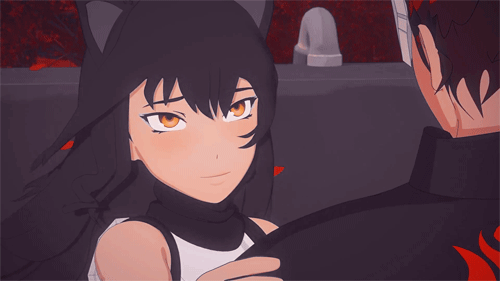
From shadows,
We'll descend upon the world,
Take back what you stole.
From shadows,
We'll reclaim our destiny,
Set our future free,
And we'll rise.
And we'll rise.
Tarzan is the "stud", who protects the woman and is linked to physical strength. Adam embodies exactly this:

In the Black Trailer he is introduced as an incredibly effective fighter, who takes the lead in his and Blake's fight against the robots and even saves Blake physically. This fits his ideology rooted in violence:
You'll see
I'm their hero
I'll be lionized
I have the strength to do what's needed
Unify our people
with no compromise
Champion the truth
until they recognize
Lead them to salvation
and regain our lives
Blake starts the story by Adam's side and this means 2 things, when it comes to her animus:
She depends on Adam's perceived prowess
She believes the faunus/human conflict can only be solved with strength
In other words, she is passive and her ideology is simplistic and radicalized. This last point fits very well a person who still has to integrate with her animus:
The animus is like an unconscious mind. It manifests negatively in fixed ideas, unconscious assumptions and conventional opinions. A person unconscious of her masculine side tends to be highly opinionated—animus-possessed.
Blake is initially animus-possessed, which is narratively conveyed by her relationship with Adam being abusive. Adam manipulates and enslaves her to the point Blake can't leave and is caught in her partner's dangerous mindset. Her growth lies in separating herself from Adam and finding her own path.
Your hopes have become my burden. I will find my own liberation…
This quote has a double meaning.
It is about Blake finding her personal freedom and growing into her own person (active)
A person’s animus becomes helpful only when she can tell the difference between her inner man and herself.
It is about Blake finding her own ideals when it comes to the faunus/human conflict (logos)
A person must constantly question her ideas and opinions, measuring these against what she really thinks. If she does, the animus becomes an inner companion who gives her enterprise, courage, objectivity and spiritual wisdom.
These two sides are interconnected in Blake's arc, which really starts with her saying goodbye to Adam:

And it keeps going with her meeting Sun, her Byron.
LIKE MORNING FOLLOWS NIGHT - SUN (BYRON)
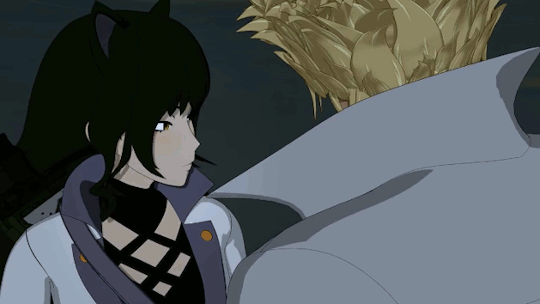
Go where you need to
Know I won't leave you
I'll follow you like morning follows night
You can run 'till your pain's through
One thing I won't do
Is let you go alone to face the fight
Byron is the wanderer who accompanies the woman into new excting adventures. This description is perfect for Sun, who is introduced as a stowaway who loves exploring the world:
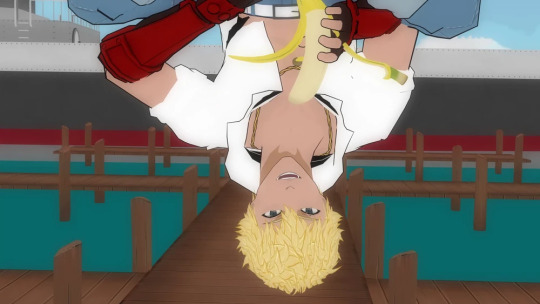
Moreover, the literal definition of the second stage is man of romance and action:
“I’m more a man of action,” Sun said. “Actions speak louder than words.” (RWBY: Before the Dawn)
Thanks to Sun, Blake grows more assertive:
In the second stage, analogous to the anima as Helen, the animus possesses initiative and the capacity for planned action. He is behind a woman’s desire for independence.
This is conveyed in their 2 major fights:
Blake and Sun vs Torchwick in volume 1
Blake and Sun vs Dragon in volume 4
In the first fight, Blake takes action to confront the White Feng. She investigates the robberies and discovers how much the organization has degenerated. In the second fight, Blake faces a giant Grimm to protect a ship. In order to succeed, she is forced to work with others, despite her stubborness on being alone.
What is more, the 2 battles are the result of Sun following Blake, when she runs away from a teammate. Both times, Blake is fleeing a conflict:
She runs from Weiss, who is linked to the human/faunus divide
She runs from Yang, who is linked to the consequences of Adam's abusive relationship
And yet, Blake is only superficially running away. On a deeper level, she is facing parts of her past, so that she can come back stronger. On the one hand she confronts the White Feng in volume 1. On the other hand she goes back to her family in volume 4. Sun stands beside her in both situations and encourages her to open up and lean on others:
Sun: So… have you told your friends any of this?
Sun: You can make your own choices, sure. But you don't get to make ours. When your friends fight for you, it's because we want to. So stop pushing us out. That hurts more than anything the bad guys could ever do to us.
At the same time, Sun helps Blake develop her ideas in regards to the faunus:
Blake: Sun… Are you familiar with the White Fang?
Sun: Of course! I don't think there's a Faunus on the planet who hasn't heard of them. Stupid, holier-than-thou creeps that use force to get whatever they want. Bunch of freaks, if you ask me!
Blake: I was once a member of the White Fang.
Blake: That's not the point, Sun! We asked to be equal, to be treated just like everyone else! Instead, we were given an island and told to make do. So we did the best we could. We came together and we made a home where any Faunus could feel welcome. But this island, this town, will always be a reminder that we're still not equal. That we're still second-class citizens.
Sun is a faunus like Blake, but he is also different in the sense he is mostly ignorant on the history of faunus rights and movements. This means he has somehow of a simplistic vision, but also that he challenges Blake to explain herself. In other words, he helps her nurture her logos and ideals. This may be why they share a conversation about words:
Blake: No, it's okay. Have you ever met someone and thought to yourself, "They are the personification of this word"?
After all, logos literally means word other than thought, so this scene symbolically ties with Blake's inner animus growth. Specifically, it marks a shift in Blake's mentality. Initially, she links others to fixed words. Still, with time she realizes people are not so simple:
Blake: At first I thought Adam was "justice", then I thought he was "passion". But over time, I realized I was wrong. He wasn't any of those things. He was "spite". Not "hatred", not "rage", "spite". He won't accept equality, only suffering for what he feels the world did to him, and his way of thinking is dangerously contagious. That's what worries me about Ilia. She's not like Adam, not yet at least, but I don't know how long that will last.
Blake leaves her black and white vision behind and embraces complexity. This is why Sun remains indefinite:
Sun: What am I?
Blake: Jury's still out on that one, but I'm leaning towards "earnest".
Blake and Sun's relationship is a transformative bond, which keeps challenging our cat girl and helps her change. In this way, she finds a new inner determination to move forward:
Blake: I'm going to try and help her the way you helped me. You showed me that sometimes you need to be there for a friend even when they don't want you to be. I was drowning in guilt and fear, I tried to push you away, but you didn't give up on me. And I can't give up on Ilia. It's about time I saved my friends for once.
THIS TIME - GHIRA (LLOYD GEORGE)

This time
The ways of the past we'll get over
We'll climb
Enlighten a new state of mind
And now
I'll stand with you shoulder to shoulder
Out of the ashes a new flame ignite
Rise up from shadows and into the light
We'll stand undivided
Our futures aligned
A new brotherhood
This time
Ghira is the only one of Blake's 4 animus, who isn't a romantic interest (obviously). Still, he fits because Lloyd George is the professor or orator:
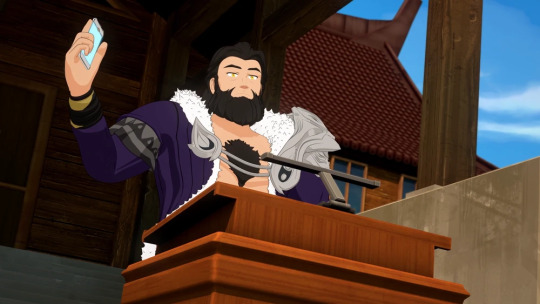
In the LLoyd George stage, the animus is the Word personified, appearing as a professor, clergyman, scholar or some other authoritarian figure.
Ghira is Blake's father and mentor. Not only that, but he is also an inspiration Blake repudiates when she follows Adam. So, our cat girl's healing journey naturally brings her back to him:
Blake: I should have left the White Fang with you and Mom. I should've listened to you, and I'm sorry. (turning away) I'm so, so sorry.
Ghira: Blake, it's fine. We never held anything against you, and I never feared you would fail. The only thing I ever feared was that you would fall down the wrong path, and I am so proud to see you haven't
Ghira's immediate forgiveness is key for Blake reforging herself. She has hurt and left him, but Ghira doesn't hold it against her. He even highlights Blake's bravery in coming back and facing her mistakes. He answers Blake's shame with pride and shows people can forgive a loved one's mistake. This helps Blake with her twisted self-perception.
Moreover, Ghira is extremely important when it comes to Blake's ideals. After all, he is the founder and previous leader of the White Feng and the one who brings Blake up to be passionate about faunus right and political activism. By reconciling with him, Blake also reconciles with his ideals:
Blake: We're not going to destroy the White Fang. We're going to take it back.
She vows not to destroy the White Feng, but to make it as it used to be, better even. In other words, she vows to follow in Ghira's footsteps and to surpass him. And she delivers:
Blake: Humans didn't do this. We did this: Faunus. We did this to ourselves. We are just as capable of hate and violence as the humans, but I don't think any of us would jump at the chance to point that out. So why are we letting Adam do it for us?! By doing nothing and staying silent, we let others speak and act in our place. And if we're not proud of the choices they make, then we have no one to blame but ourselves. This is the message that Adam Taurus will bring to the world if no one stops him. But we can stop him!
Volume 5 opens with Ghira failing to make a speech and it ends with Blake succeeding. She inspires her people and finally finds her personal answer and belief-system:
Blake: You have to understand that all of you are looking for simple answers to a very complicated problem. And I can't give that to you. I don't know how to make hate go away, I don't. But I know that this kind of violence is not the solution. I understand that to ask you to leave your homes and protect Haven Academy is asking you to put your lives at risk. But that's what's at stake. So I'm going, and I'll stand by myself if I have to.
This is true also on a personal level:
Saber: Huh? You're just going to forgive her? After everything she did?!
Blake: I am.
Ghira: She's learned a lesson that evaded me until I was much older: That there is strength in forgiveness.
Blake forgives Ilia, just like Ghira forgives her. In this way, she also fully forgives her past self and moves forward. And her new found passion, hope and determination spread all around. To both Ghira, who starts a new movement and obviously to Ilia, who is saved in two ways:
Ilia: I still don't feel like I deserve the freedom you and your family granted me.
Blake: Well, you're going to have to get over it, Ilia. Saving Haven had a huge impact on how Faunus are seen in Mistral. Now it's up to you all to take the progress and keep running with it.
Ilia: Right. The White Fang may have been a failure, but with your father starting up a new movement, I've got more faith than ever before. Thank you, Blake, for everything. I wish you didn't have to go.
She is given freedom and she finds a new motivation in Ghira's new group. Her finale mirrors Blake's state of mind after Haven. She is a new person, ready to enter her finale stage of animus development.
NEVERMORE - YANG (HERMES)

Nevermore
Nevermore
You'll torture my heart and my head
Nevermore
Nevermore
Will I be afraid
Nor will I run away
It's behind me
Freedom is finally here
You may have taken the lead but I'll even the score
You won the battle you won't win the war
Not now and
Nevermore
Hermes is the highest stage of the animus and the incarnation of spiritual meaning:
The animus mediates between the conscious mind and the unconscious. He is a messanger and a helpful guide.
Blake: I'm not sure there are many good options left for any of us anymore. Keeping secrets, taking lives? It makes you wonder how far we're gonna have to go to keep doing the right thing.
Yang: Blake.
Yang: We did… what we had to do.
Blake: I know. But next time, I wanna make sure we don't have to, and I can tell you, ambushing a Huntress who's just trying to help isn't an option I'm thrilled about choosing.
Blake crosses her arms, and her cat ears completely fold over.
Yang: Then, maybe we shouldn't.
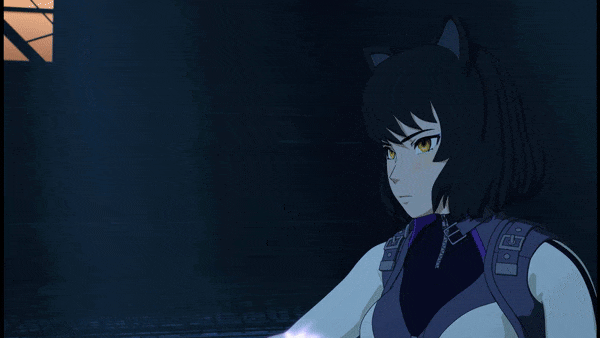
Sexuality for a person with such an animus is imbued with spiritual significance.

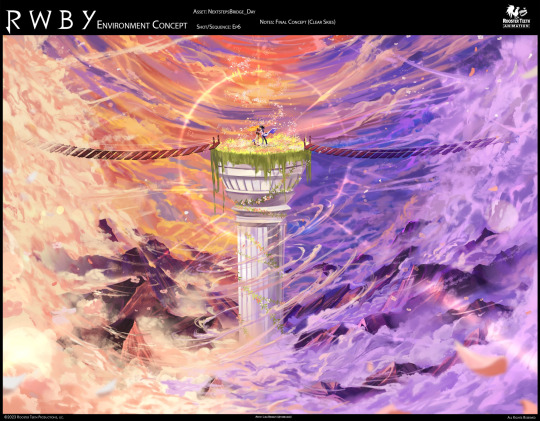
As shown above, Yang fits this archetype. As a matter of fact, she and Blake are opposite, so they balance each other out, both when it comes to macro issues and in their personal relationship.
Their confrontation on how to deal with Robyn in volume 7 is a perfect example of this:
Yang: Do you… Do you think we should've told Ironwood about Salem, before he put so much on the line for Amity?
Blake: Sounds like you do.
Yang: I trust Ruby, but I think he deserves to know what he's stepping into. We all did.
Blake remains quiet, her cat ears folding over a little. Yang turns and looks at her.
Yang: You don't agree.
Blake: Look around. The embargo, the military presence, the restrictions on assembly. He's a bit prone to overreacting.
Yang: Yeah, hard to argue with that. Still, he didn't have a lot of good options.
The girls disagree on what is better to do. Blake thinks they should prioritize the stability of Atlas and Mantle, at the cost of lying to Ironwood. Yang instead believes Ironwood as a person has the right to know what he is really fighting against. In other words, Blake thinks about the macrochosm and Yang about the microchosm. This is important because it is just another way the bees are complementary. In order they are:
dark (Blake)/ light (Yang) > shadow/persona archetypes
feminine (Blake)/ masculine (Yang) > anima/animus archetype
macrochosm (Blake)/ microchosm (Yang) > self archetype
In other words, they complete each other when it comes to all the major archetypes. It is from these differences that an enriching balance is found. And the compromise they come up with in Atlas ties into it. They trust an individual (Robyn) hoping it will lead to a more stable situation in the whole Kingdom.
At the same time, this equilibrium between opposites can't be found without a proper inner balance, which is the result of the girls' individual development. When it comes to Blake especially, she has to:
Find her own personal answer to the faunus/human rift
See and accept others in all their complexity (light + shadows)
This last point especially ties with the animus journey, which is about seeing a partner as an individual with both flaws and strengths. This fits Yang in particular:
Blake: And I'll protect you.
At this, Yang's eyes widen and her expression turns into a frown.
Adam: Heh, do you really believe that? Or are you just trying to scare me away so you won't have to die trying to protect her?
The major conflict upon Blake and Yang's reunion in volume 6 is that they struggle to symbolically reconcile the feminine and the masculine, the damsel and the knight. The answer is that there are not such specific roles in their relationship:
Blake: She's not protecting me, Adam. And I'm not protecting her. We're protecting each other.
They are both damsels and knights, beauties and beasts. Yang is the embodyment of strength in Blake's eyes. Still, she is also a person with her own vulnerabilities. And Blake is ready to accept all about her.
The same goes for Yang too, who is able to defeat Adam specifically because she never loses sight of Blake. She knows who Blake really is and is ready to embrace her as a whole:

Bumbleby's fight against Adam is the moment they affirm their own complementarity and willingness to see each other as wholes. The bridge scene in volume 9 is a top off and confirmation of this wish.
Blake: I… think, you're an extraordinary person.You're… always the first to lighten a situation. You act bravely, when you're afraid. You do what you say.
Yang: Even when they (people) hurt you. You never give up. You know what matters to you.
They can see the beauty in each other and also accept the other's beast:
Yang: I like that you've never been intimidated by me. Even when you didn't like me all that much.
Blake: I was a little wary of people in general.
Yang: But you never gave up on them.
At the same time, they reach the platform and so symbolically unity because once again they are complementary. Blake is mind (the result of her animus integration). She's got "a really good brain" and eventually figures out what they have to do to move forward on the bridge:
Blake: Maybe it's… saying things we never said. To each other.
Yang is heart (the result of her anima integration). She is the one who starts complimenting Blake first and opens up a path for them. Eventually, she is the one who starts the confession and shows vulnerability, leading them both on the platform:
Blake: (in thought) I think we're already falling. (turns to Yang) Just, say it, Yang.
Yang: I think I love you.
There they unite, which marks Blake's final step of integration with her animus.
BEAUTY AND BEAST (THE ANIMUS AND THE SHADOW)
This was a short summary of Blake's arc through the anima/animus lens. One final thing to add is that this specific way to interpret her story also fits with her fairy tale: The Beauty and the Beast.
This story can, in fact, be read in 2 different and complementary ways:
It is the story of how an individual can combine light (beauty) and shadow (beast) into one harmonic unit > persona and shadow
It is the story of 2 individuals, one encarnating the masculine (beast) and the other the feminine (beauty), who forge a strong relationship and find balance > anima/animus
This is really Blake's arc in a nutshell, so it is really fitting she is the RWBY embodyment of Beauty&Beast!
110 notes
·
View notes
Text
@poke-maniac
I am making this post because it was too frustrating replying in the comments section of the original post.
“ I said that money was a mean to make his company more successful as he himself admits, not just for power's sake.”
Yes, but I wonder what making his company more successful would do to the amount of power he wields. Could it be that it would generate MORE power for him??????????????
“Which is more or less confirmed in sinister war, but since you ignore everything that happens after post OMD as if nothing was canon anymore, I guess you don't see it as a valid argument.”
It’s more than just that I discount it for being post-OMD. From what you have described of Sinister War I do not see how this goes against anything I have said. Norman wanted to money to make his company more successful. But in doing this he makes himself more powerful.
The priority is ALWAYS power. In fact, few people who are rich assholes as you put it are in it for the sake of money alone, but predominantly for the POWER that money grants them.
But even if we argue that there those who really are JUST in it for the money, Norman isn’t one of them as he literally told us that in ASM #40:



Oh look, Norman EXPLICTELY saying that he needed to become wealthy because that was the only way he could become POWERFUL!
“We shouldn't apply real life psychology to fictional people,”
This is, simply put, one of the most astronomically bad takes I have ever had the misfortune of reading.
There is so much to unpack with this, but let’s just get down to the basics. If we aren’t going to apply real life psychology to fictional people what the fuck does the term ‘believable character’ even mean. How are they believable if not in terms of who they are, what they think, what they feel, how they act is psychologically realistic. Because that is what psychology boils down to ‘what is happening inside of a human being to make them behave the way they behave’.
Second of all, there is a GIGANTIC overlap between the mental muscles and psychologists and good writers flex for the very obvious reason that both jobs entail getting inside people’s heads. Its just that for writers those people happen to be fictional.
The proof in the pudding of this is Carl Jung, perhaps the second most famous psychologist behind Freud himself, and indeed was at a time viewed by Freud as his heir in the field of psychology. Jung’s works are massive and complicated to explain but one of the things he often brought up was the connection between psychology and mythology/fairy tales/folklore.
“Like Freud, the psychologist Carl Jung also took myths seriously. Jung believed that myths and dreams were expressions of the collective unconscious, in that they express core ideas that are part of the human species as a whole. In other words, myths express wisdom that has been encoded in all humans, perhaps by means of evolution or through some spiritual process. For Jungians, this common origin in the collective unconscious explains why myths from societies at the opposite ends of the earth can be strikingly similar. ”-
This school of thought is eventually what led literature professor Joseph Campbell to study myths from various cultures and write his landmark book ‘The Hero with a Thousand Faces’. Here is a wikipedia excerpt about the book:
“The book includes a discussion of "the hero's journey" by using the Freudian concepts popular in the 1940s and 1950s. Campbell's theory incorporates a mixture of Jungian archetypes, unconscious forces, and Arnold van Gennep's structuring of rites of passage rituals to provide some illumination.[4] ”-
So psychology and storytelling are inherently intertwined and ALWAYS have been.
Third of all, there is no end of examples of critically acclaimed works of fiction that DO apply real life psychology to fictional people. Breaking Bad is one seasons long epic exploring the realistic psychological change of Walter White into a drug kingpin.
The Sopranos stemmed from creator David Chase’s psychological struggles with his mother and the therapy he went through to try and deal with it. Not only was it applying psychological realism to these fictional gangsters (and their families) but it went so far as to have a psychologist as a main character and make her sessions with Tony Soprano integral to the plot/character exploration of Tony himself.
And, just in case you were trying to say ‘fictional comic book people’, Batman’s villains are regarded as the best villains in mainstream comic book history in large part because because of their psychological complexities. There is literally a podcast hosted by a real life psychologist where they review and apply psychological realism to every episode of Batman the Animated Series:
The fact that she was able to do that at all speaks to how clearly the writers WERE applying real life psychology when writing Batman the Animated Series, the most transparent example being ‘Mad Love’, the origin of Harley Quinn. not only was Harley a psychologist herself, but her origin story stemmed directly fro co-creator Paul Dini's experiences with therapy and includes one of your so called 'Freuduan excuses' for why Harley is the way she is:
"Paul Dini: I’m no stranger to therapy. I was spending some time in therapy and was in my head a lot around that time. Bruce and I were discussing her origin one day over lunch, because I had been approached by DC to do a special issue of the comic, and we were talking about what if there was some sort of surprise to her origin? What if she’s not just a hench girl? We came up with the idea that she had been a doctor at Arkham Asylum and the Joker had gotten into her head and worked her into being his follower. … Then we thought, what if Harley’s in the role of the long-suffering girlfriend?
There was also an element of the fans who write to a prisoner who committed a terrible crime and say, “I understand you… I see the good in you,” and sometimes develop a relationship."

Bill Mantlo literally name dropped a psychological term during one of his 1980s Spider-Man stories. They got the term wrong, but the desire to use it at all when it wasn’t necessary ever so slightly hints that comic book writers frequently DO try to apply psychological realism to these fictional people.

Iconic Iron Man writer/prolific Spider-Man writer/co-creator of Venom and Carnage David Michelinie featured a psychologist character in at least two of his Spider-Man stories and used his insights as a way for Spider-Man to defeat both Doc Ock and Venom.

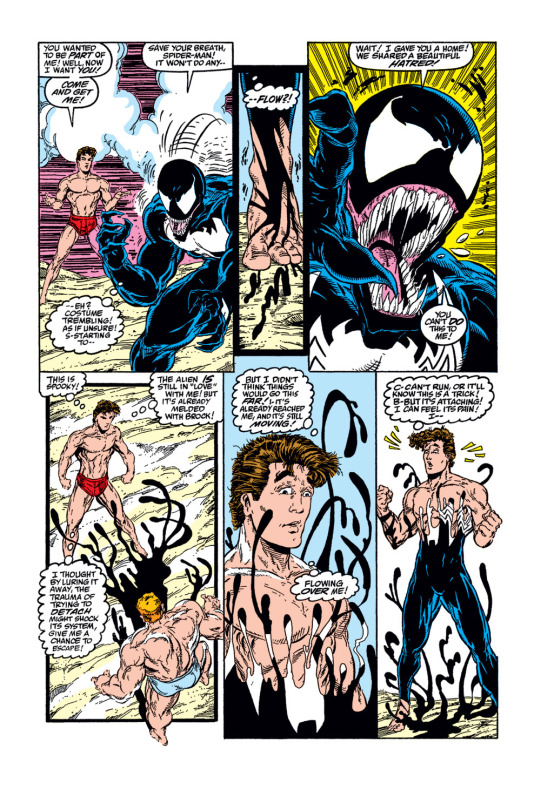
Bruce Banner/the Hulk is a character who hinges upon psychological realism. The entire premise of the character is that he has disassociative identity disorder and that the famous green savage Hulk everyone knows is an expression of his traumatised inner child throwing a gamma fuelled temper tantrum.
Peter David, who has written MANY Spider-Man stories including the iconic ‘Death of Jean DeWolff’, literally wrote an issue that took place inside Bruce Banner’s mind and where his fragmented identity (Bruce banner, Green Hulk, Grey Hulk) is made whole; an issue outright called 'Honey I Shrunk the Hulk' (as in head shrink).
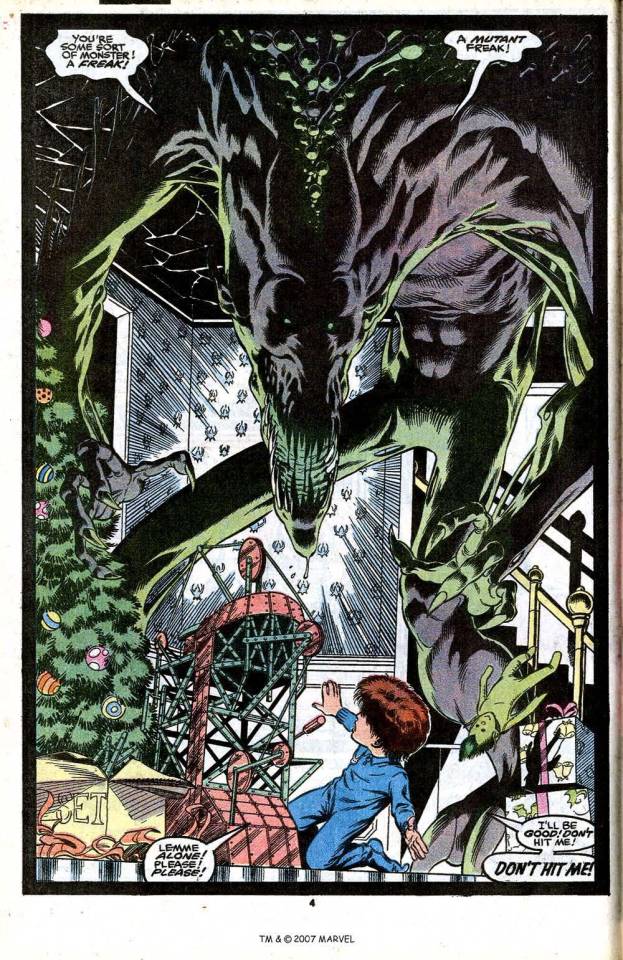
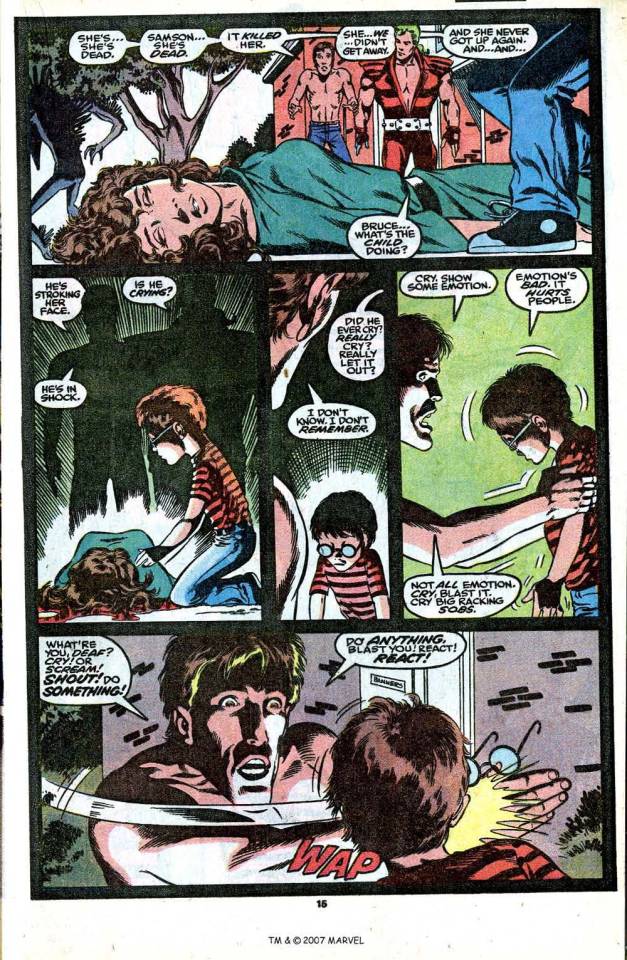

(Oh look, an abusive father who hit Bruce. Guess the Hulk's origin doesn't make sense and is shit now too).
PAD’s Hulk yarn wasn’t the only Marvel story in the 1990s that literally dives into the head of a fictional person (i.e. the most blatant example of trying to apply psychological realism to them). There was also two stories that did exactly that with symbiotic serial killer Carnage:
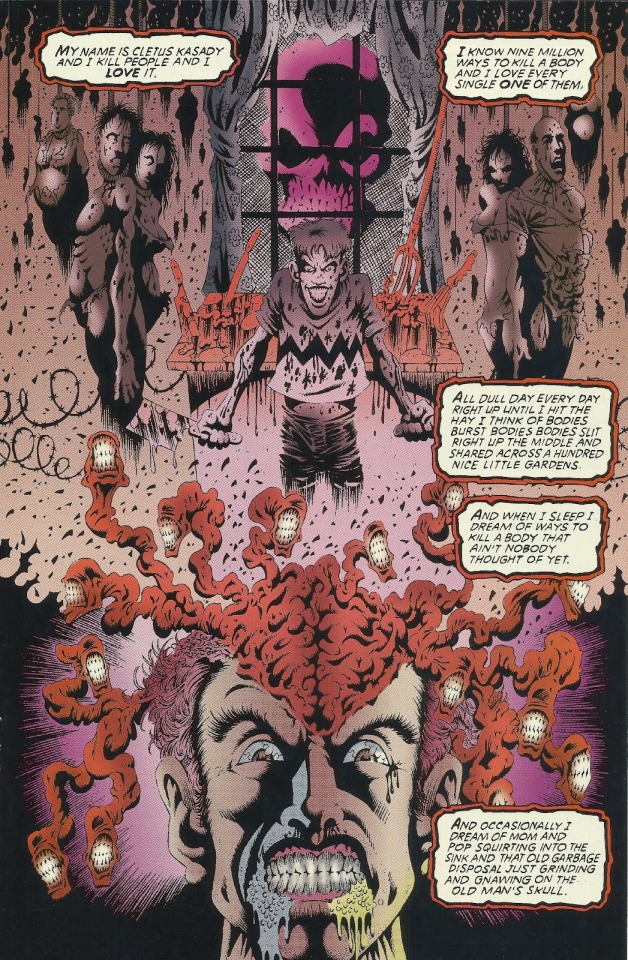
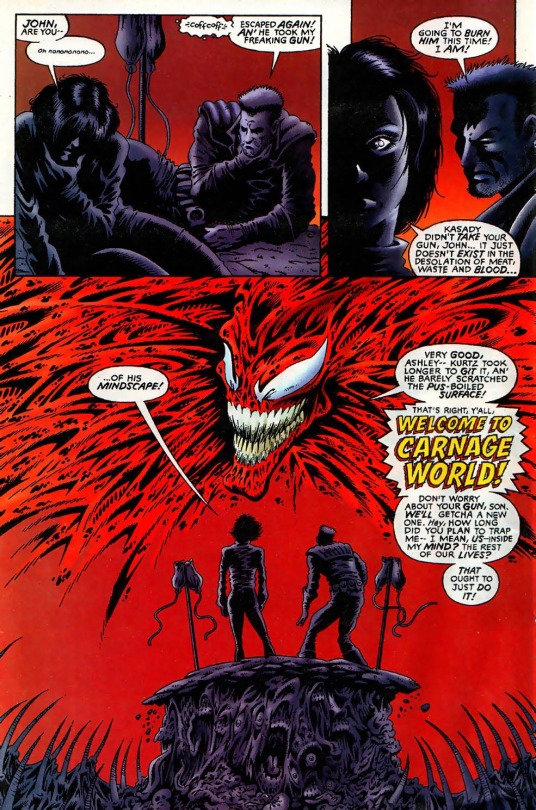
One of those characters was Dr Ashley Kafka, a psychologist supporting character introduced for Spider-Man stories.
Hmmm…why would Spider-Man comics introduce a psychologist as a supporting character? Well, there could be various uses for a character like that but perhaps one of them might be to offer realistic psychological insights into these fictional people. Fictional people like Venom.

Or Vermin.
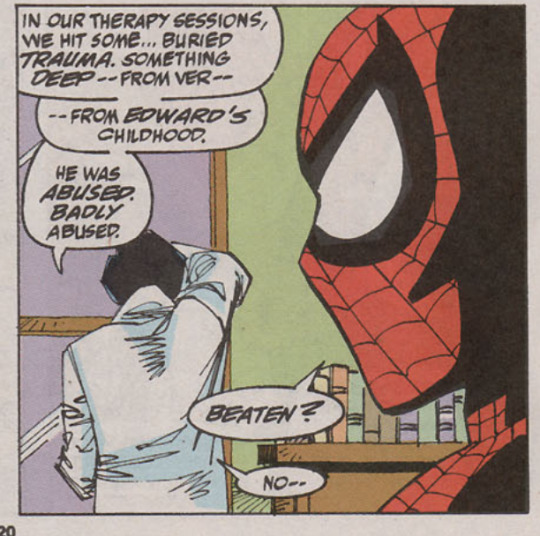

Or the Chameleon.
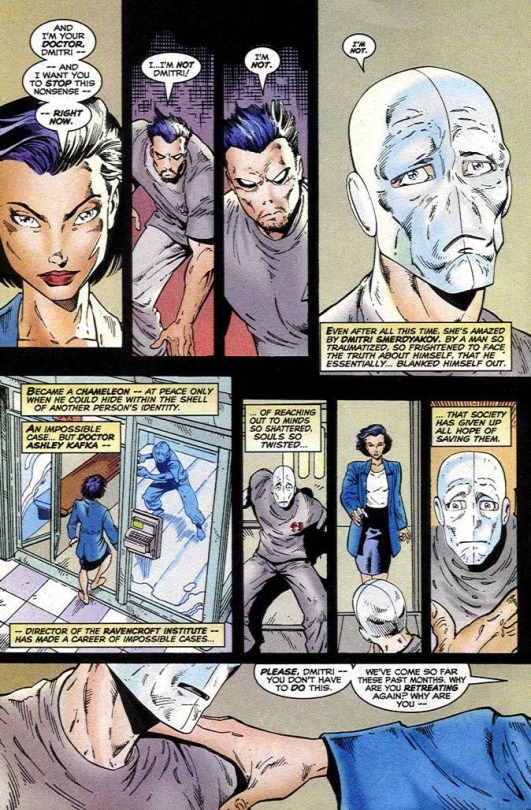
Hey, who created Ashley Kafka anyway?
It was prolific comic book writer J.M. DeMatteis. I wonder why he was so prolific, I mean what sort of stories has he done over at DC?
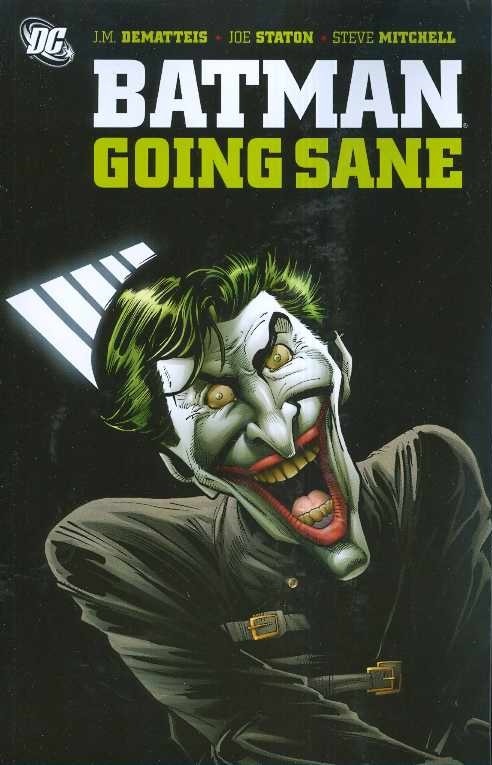
Oh…a story that acts as a psychological exploration of the Joker and his relationship to Batman. Fun fact, this story was originally rejects by DC because it was too similar to the Killing Joke…because it was also a psychological exploration of the Joker and his relationship to Batman.
Over at Marvel though, other than creating Ashley Kafka, what did J.M. DeMatteis write?
Oh, that’s right….
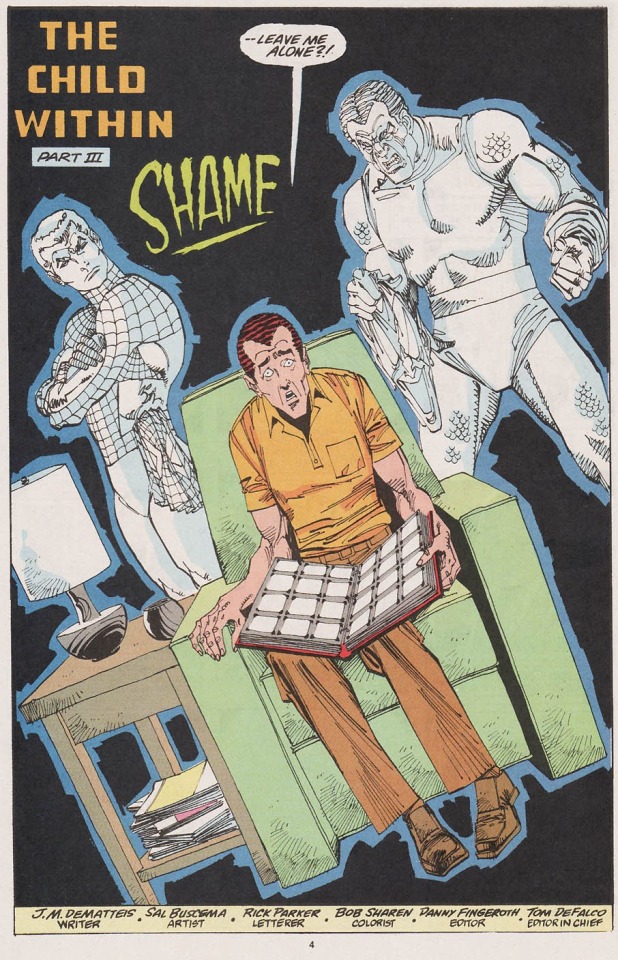
And...

And...
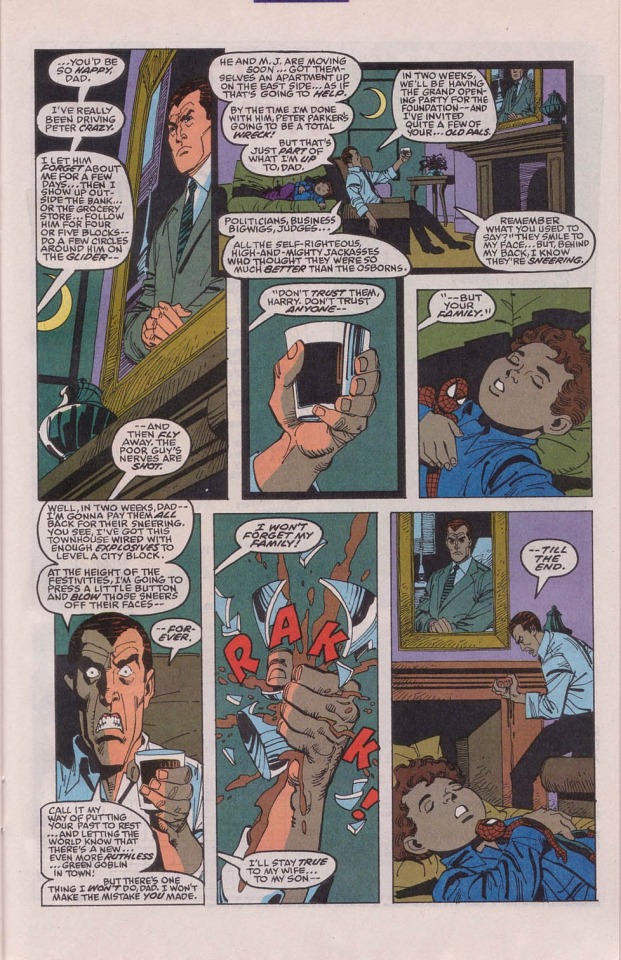
And...

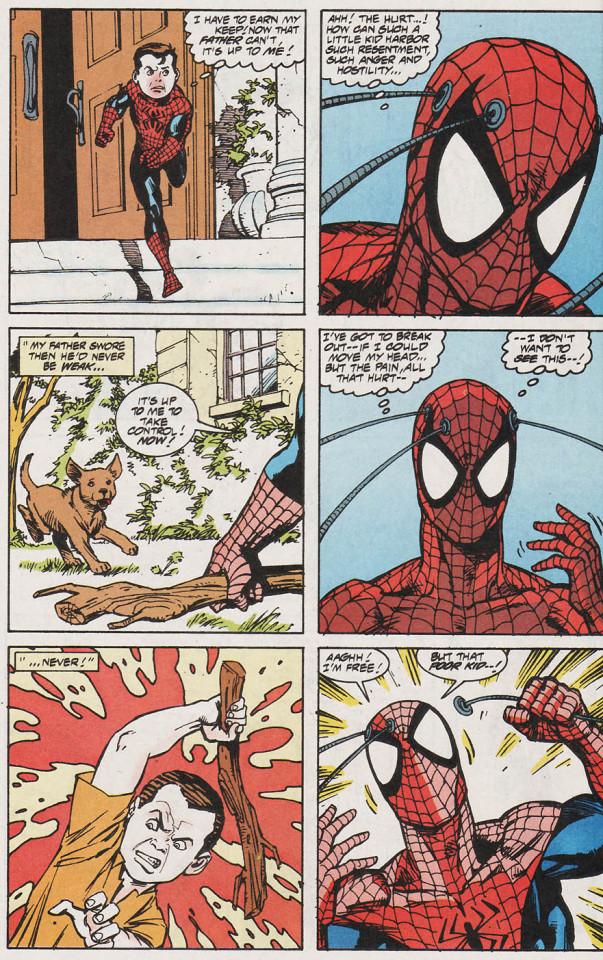

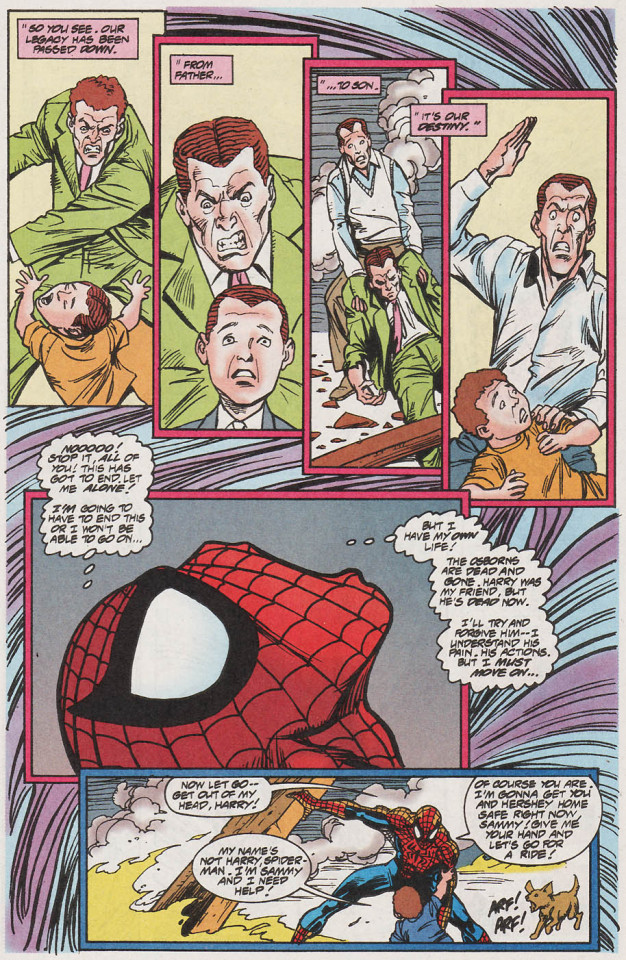
He wrote many of the stories we’ve been talking about this whole time. He was the guy who retconned the origin of Norman and Harry Osborn and explored Norman’s childhood in the first place.
Now it is a sad reality that there isn’t a single direct quote from DeMatteis proving he did in fact try to apply psychological realism when writing fictional people…
"We write about the things that obsess us. The themes in a writer’s work are the themes of a writer’s life. The Big Theme that has always obsessed me is the search for meaning, for personal, and cosmic, identity. Who are we? Why are we here? What’s the meaning of it all? Exploring those ideas, from both a psychological and spiritual perspective, is the driving force behind many of my stories, whether they’re more personal projects like Moonshadow or more popular ones like Spider-Man."
"I enjoy reading books about psychology and spirituality, books that explore the shadowed caverns of our psyches and the luminous castles of our souls."
"All the clever plotting in the world won’t help if it’s not grounded in psychologically real, relatable, characters."
"Peter Parker is one of the most psychologically and emotionally real characters in the history of comics"
"Harry and Peter are both very complex people, which meant that while the superhero action played out there was lots of room for psychological and emotional exploration."
…there are MULTIPLE direct quotes proving exactly that.
So YES we categorically should apply real life psychology to fictional people!
“ especially that nothing suggests in canon that his [Norman Osborn’s] dad was beating him to "feel powe[rful]”
I’ve said before and I will say it again, that is EXACTLY what is suggested by Spec Annual 1994 and Revenge of the Green Goblin.

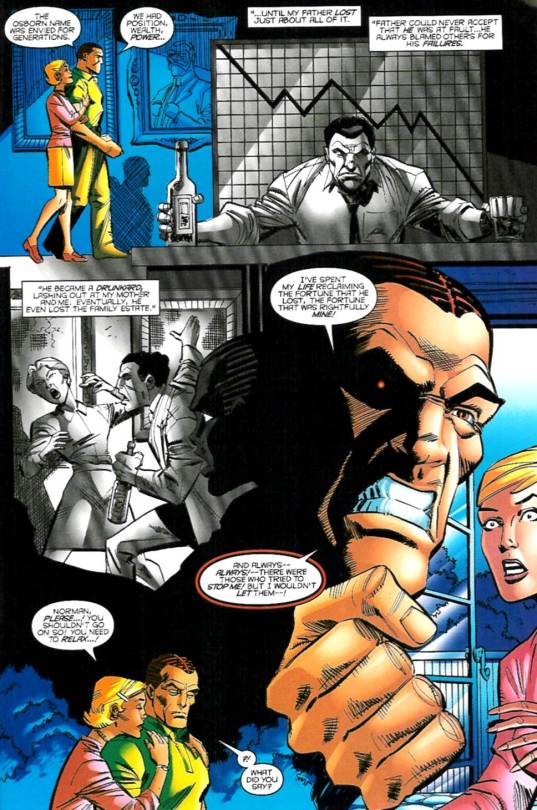
Norman's Dad loses the business and lashes at his son but this had NOTHING to do with him feeling powerless?
What do you think it means when someone feels powerless?
What do you think it means when someone of the old school tries to reaffirm that they are still 'a man'?
It is about power!
“All that's textually said is that he was lashing out on his family, in rage like many people irl when they lose everything.”
Yes but why would someone IRL lash out when they lose everything.
*gasp!*
You don’t possibly think they do that because losing everything makes them feel powerless and bullying someone else in turn makes them feel powerful, do you????????????? Feeling powerful couldn’t possibly be the root cause of why anyone bullies anyone else ever could it????????????????????????????????????????
Its almost like in textually saying he was lashing out because he lost everything it made him feel powerful or something?
Oh and by the way, ever so slightly undermined your own argument there. “We shouldn't apply real life psychology to fictional people,” vs. “…was lashing out on his family, in rage like many people irl when they lose everything.”
Which is it?
(not to mention if we aren’t supposed to apply real life psychology to fictional people why were you doing exactly that with your avatar examples?)
“Yeah the amnesia part never made any sense to begin with. It's said that the formula made him worse yet it doesn't seem to affect "amnesic" Norman all that much. Maybe it does? Because we don't see him all that much during his amnesia periods.”
We see PLENTY of Norman when he has amnesia.
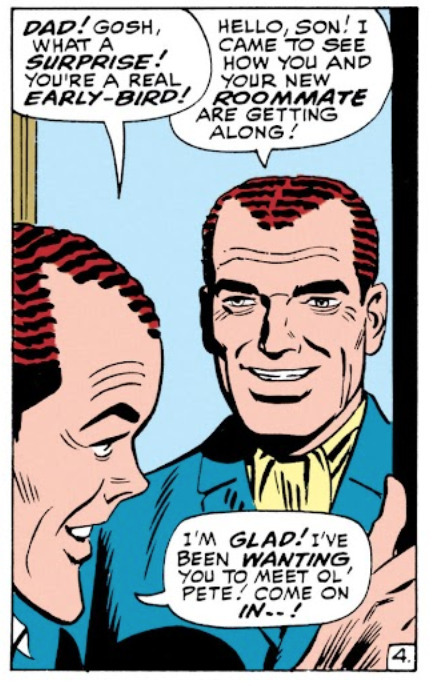

So no the formula does not affect norman when he has amnesia.
But an idea slightly suggested in ASM #40 and then eventually confirmed in Revenge of the Green goblin was that the formula made norman worse because in giving him powers it acted as proof he was superior to everyone else, in other words it sent him on a huge ego trip.

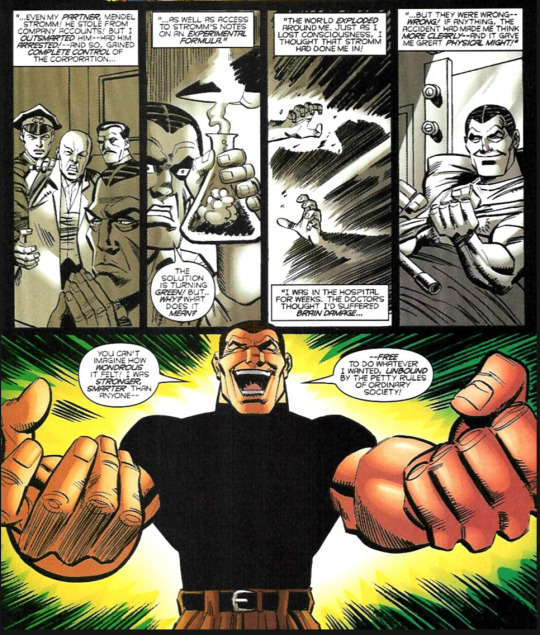
You know what would be interesting? If this Norman Osborn guy who is on a big ego/power trip formed a rivalry with a superhero who began his career on a big ego trip before being humbled. Especially if that hero’s defining philosophy was ‘with great power there must also come great responsibility…
“It honestly looks like a cheap excuse to keep him from telling the truth more than anything”
And as originally written by Stan, it was exactly that. It was taboo for a villain to know the hero’s identity back in the 1960s, or at least for them to go on living with that knowledge. Later stories however addressed this.
“But anyway, it just makes weird that his amnesia would make him a completely different guy if he was the same ashole during this specific time period he remembers (before Harry high school years).”
You haven’t been listening to me at all. You have never once addressed what I have said on this subject.
But I will repeat it again:
WE ARE THE PRODUCT OF OUR MEMORIES! IF YOU CHANGE THE MEMORIES YOU CHANGE THE PERSON!
You want a quick fictional example of this? The Arnie movie Total Recall.
In other words, the ONLY logical explanation for Norman becoming nice is because he DIDN’T just forget his memories after he became the Goblin. He forgot MORE than just that. Which is what happens with real life amnesia. You don’t just forget a set time period.
Yes the narrative has Spider-Man claim it is just everything after the accident that turned him into the Goblin, but how the fuck does Spider-Man know that for sure?
What we have is an objective flashback showing us exactly what Norman was like before the accident, we have objective on the page evidence of what he was like after the accident and we have objective on the page evidence of what he was like post amnesia. Post-accident is basically a bigger jerk of who he was pre-accident. Post-amensia is at odds with both versions.
The ONLY explanation that makes sense is that he didn’t simply forget the last few years, he forgot more than that. he forgot whatever life experiences shaped him into a bad person, or at least he couldn’t remember them clearly. Perhaps he could remember events but not the feelings associated with them.
This syncs up with how IRL amnesia works and reconciles everything, whether you look at the stories in the 1960s on their own or look beyond that decade.
“One could argue that he gradually became more and more neglectful. If Harry is just in denial as he can't see faults in his dad's parenting why did he spot a difference then? If his dad was acting the same as he always did, why would he be only in denial over how his dad acted prior to accident?”
Yeah MAYBE he did become more and more neglectful, but there is nothing on page suggesting that. We just know he WAS neglectful.
But alright, the idea that from Harry’s POV there was a time when things were better but got way worse before the accident, that could fit with the original story.
You know what else could fit just as well? That Harry is in denial. Because he wants/needs to believe at some point he and his Dad had a positive relationship when they actually never did.
Denial doesn’t work on the basis that it is 100% consistent all of the time. Norman was MUCH worse after the accident and Harry was also older and less impressionable and that change occurred within the last few years of his life circa ASM #39. All those factors combined make it entirely possible that he found it harder to deny that his Dad had changed. He’d gone from neglecting him and palming him off to almost entirely isolating himself and become more outspokenly verbally abusive and belittling.
Both were bad situations, but one was much worse.
Oh and be careful, because you almost sound like you are trying to apply real life psychology to counter my points. I thought we weren’t supposed to do that with fictional people?
“Why only complain about his dad's recent outbursts? It's clear that his dad is acting differently towards him. They had some good time together (despite his dad's obssesion over work) before the accident then his behavior towards Harry changed.”
No they didn’t. That’s the point of the story. They DIDN’T have good times together, but by the end of ASM #40 they now hopefully can have good times together.
The ASM #40 flashbacks are the deal breaker on all this. These aren’t simply flashbacks from Norman or Harry’s POV, these are from the omniscient POV as what they are depicting is not in line with what Norman is claiming. And they are not in line with what Harry was claiming in ASm #39 either.
Harry was NOT having a good time ever in those flashbacks and Norman was NOT being a good father.
Thing simply got WORSE after the accident.
Why is it so hard for you to buy into the idea that Harry is in denial?
Your approach is ‘Harry made this claim in a piece of dialogue therefore it MUST be completely true’. Even though the very next issue disproves it. Norman even says ‘I tried to be a pal to Harry’, he uses that exact word ‘pal’. And we see from those flashbacks that, no, he was not being a pal to Harry. He was being a shitty father. He was neglecting him, not talking to him, not engaging him or spending time with him.
So Norman is in denial and that was the point of the scene. BUT Harry, who has his DNA, couldn’t POSSIBLY be in denial also? There simply MUST be these magical phantom scenes we coincidentally never got to see where in fact they were BFFs?
Why is that more believable than ‘both father and son are mentally messed up’.
“Also bad person =/= bad father.”
That lacks nuance. You can be a good parent but in other ways a bad person, that is true.
But if you are a bad parent (specifically abusive, neglectful, putting yourself ahead of your child) you are as a matter of fact a bad person. There is nothing more important than raising a child.
“I'm just arguing about his parenting, not his morality,”
In this situation they are one and the same thing.
The things that make Norman a bad person are in turn what led to him being a bad father. He doesn’t have the ability to be a good father because he is a bad person.
During the Stan run, Norman pre-accident was also a bad parent and a bad person but to a lesser degree. That’s all there is to it. he railroaded his partner. He stole his innovations. He was after money and power. He neglected his son and priotised his pursuit of power ahead of his son’s wellbeing.
That is a BAD person, it just isn’t a total fucking monster which is what the retcons developed him into.
“we don't see much of him during his amnesia period to conclude that he was an all around a good person, just that he was a better dad.”
*pinches bridge of nose*
During his amnesia period (and excluding the period where he was in the process of remembering he was the Goblin) was Norman neglecting his son? No. Was he railroading his business partners? No. Was he stealing their inventions? No.
Oh, he WASN’T doing the things we saw him doing in the pre-flashbacks. But you know what he WAS doing? Being nice to his son. Spending time with his son. Making his son happy.
Hmmmm…its almost as if the things ASM #40 showed us about how pre-accident Norman was a bad person were either absent or directly the opposite with amnesiac Norman.
“But yeah, you're right, this amnesia plot device makes no sense no matter how you look at it but to me it looks like the implications is that his personality was reset before his accident. But to each their own, I guess .”
A story can imply one thing but show another or contradict itself. What is actually happening is more important than implications.
“I agree that Norman abusive background explains why he treats Harry so horribly as it was textually explained, as well as why he's so comfortable with his own darkness, his toxic masculinity but it doesn't explain as well why he became so obsessed with restoring his family's name, wealth, having social power.”
BECAUSE HIS DAD LOST THAT!
Do I actually need to explain that children are heavily influenced by their parents? That they subconsciously look to their parents as role models, that they seek their approval, that how their parents treats them shapes who they grow up to be?
If Norman’s Dad LOST the family’s prestige and was obviously upset about it and that in turn led to him hurting Norman OF COURSE Norman would want to restore it. He would have learned that prestige was important. Thus in restoring on some subcionsious level he’d:
Be making his father proud
Proving himself BETTER than the man who was his physical superior
Avoiding becoming like his father who he saw broken down and rendered weak by losing the company
Making himself powerful and therefore not weak, not like his father who was rendered weak/the helpless weak little boy his father bullied
“It's not about real life psychology, it's all about WRITING.”
THOSE AMOUNT TO THE SAME THING!
You can’t BE a good character writing without applying real life psychology! Because to be a good character writer you NEED to make your characters psychologically convincing, otherwise nobody would buy into them.
See above when I disproved your bullshit about not applying psychology to fiction.
You don’t NEED to have a psychology degree to write good characters but you do NEED to be able to get inside a fictional person’s head and render them as believable. And that would entail making them psychologically realistic.
William Shakespeare never studied psychology. He literally couldn’t have. But he was nevertheless able to write psychologically convincing characters that we CAN successfully apply real life psychology to.
Because writers and psychologists have this gigantic overlap in their respective fields, namely, getting inside people’s heads!
“Writing a proper Freudian excuse that doesn't require ton of meta analysis, real life psychology, conjecture.”
THERE IS NO CONJECTURE! The narrative SPELLS this all out explictely!
“And I'm not denying that it might be one of the factors, but it unlike his abuse of his own son, it's not used explain why he became so fixated on restoring his family's name,”
If Norman’s Dad abused him because the family business was fucked there would obviously be an inherent link between restoring the family business and the abuse he suffered.
This isn’t a Freudian excuse, it is basic bitch literary analysis. High schoolers could grasp this.
Norman didn’t want to be weak as he was when his dad hurt him. Norman didn’t want to be weak as his father was upon losing the business. His dad hurt him because he was upset about losing the business.
Therefore, in hitting Norman, in abusing him, it acted as a powerful motivator later in life to restore the family business.
It. Is. All. There.
“obtaining social power (not just physical) expanding the Osborn legacy”
You need to understand this, not just for the sake of this argument nor for your future reading of fiction, but just plain old navigating through life itself.
Power is power.
If you are made to feel physically powerless you 100% could go on to seek social power.
If a boss makes someone feel powerless at work they could leave work and make themselves feel sexually powerful by having sex with a hooker who they ask to call them ‘boss’ in the bedroom.
If your business is failing and your money is running out so you feel financially powerless and are losing social power there is a strong possibility that you’d hit your own child to feel powerful! Just as Norman’s Dad did.
You keep belligerently REJECTING the idea that there can be a link between social power and physical power but that is the truth of the matter. Not only have I known this for years through, you know, common sense, not only have I read up about this, but just to make 100% certain I am not wrong on this I asked someone I know personally who is a professional psychologist. She confirmed exactly what I’ve been saying.
Norman’s situation is entirely realistic. Which again, is no surprise, since it was written by a DeMatteis who was heavily into psychology and was himself friends with a professional psychologist who he based Ashley Kafka upon.
Oh, but I forgot, we don’t apply IRL psychology to fictional people right? But…if we aren’t doing that…why are YOU insisting that there can be no link between social and physical power??????????????????????????
And furthermore, expanding the Osborn legacy? Yeah, powerful people have wanted to insure they have a legacy to live on after they die since time began. That hasn’t even got anything to do with abuse or psychology. That is just how most animals are wired. We want our offspring to survive us and thrive. For Norman that meant his son and company would be strong
“, why he's a psychopath who loves killing people when we he doesn't get any benefit from it (like this guard's wife) .”
*groans*
He likes killing people because it is an exercise of his power. He is a power addict. He wants more and more power and wants to use it. No one takes power and DOESN’T use it.
Killing people makes him feel powerful.
He wants to feel that way because as a child he was made to feel powerless and saw his dad lose his power.
It is as simple as that.
And you seem to be ASKING for a psychological explanation there? I thought we don’t apply that to fictional people?
Why are you asking why someone is a PSYCHOpath but reject the PSYCHOlogical explanations I’ve been providing for it?
“It doesn't automatically explain IT ALL.”
It literally does. You are just being blind to that reality.
“It's not expanded on.”
There were 3 stories exploring it across nearly 10 years.
That expands upon it pretty well.
“It's not used to explain HOW it shaped his view on power, how it shaped his ruthless and psychopathic, personality (well unless you claim it's unborn ).”
I’m so exhausted at this point. It HAS been used to explain it. It explained it blindingly obviously. I have repeated it multiple times in this post let alone all the other ones I have made during this argument.
I have to ask now if you are trolling or if you are honestly just this blind?
And, again….asking for HOW something shaped someone’s view on power, HOW it shaped their personality? Gosh…that sounds like you are asking for a psychological explanation…but one where we cannot apply real life psychology apparently.
“I just wished that this backstory was more expanded on to show HOW it shaped him”
You literally admitted you haven’t read all the stories I mentioned so how can you possibly complain about all that.
You are complaining that something wasn’t explained when
It was explained IN Revenge of the Green Goblin
RotGG itself was an expansion of Spec Annual 1994, which you said you hadn’t read
“Like, there's so much things going on with him and the authors did the minimum they could,”
They wrote THREE stories exploring Norman and Harry’s childhoods and how those shaped them!
Roger Stern.
J.M. DeMatteis.
Paul Jenkins
Howard Mackie.
FOUR people between 1993-2000 wrote THREE different stories exploring this subject and this is the ‘minimum they could’?
Fucking Hell, what more do you want?
“as if we as readers are automatically supposed to connect all dots just from the knowledge alone that his dad beat him up and that it made him feel weak, so viewed toxic masculinity as "strength" and that it made him accept his own darkness.”
The. Story. Literally. Spells. This. Out!
Go. Read. The. Above. Pages!
But also, I, as a TEN YEAR OLD, understood this from Revenge of the Green Goblin alone. I didn’t even need the Child Within or Spec Annual 1994 to GET it!
It was REALLY obvious.
I’m not saying it should have been subtle…but also it was absolutely NEVER subtle.
To say readers are supposed to automatically connect the dots is saying ‘I have REALLY limited reading comprehension skills and need to be spoon-fed info.’
“Just how are we supposed to expand it to explain his psychopathy, his obsession with restoring his family's legacy which is primary motivation for most of what he does that's not connected to Peter (like the Gathering of five).”
See above. I’ve explained how it is all connected. Better yet read the stories. Though I doubt in this case it will make much difference.
“ This is made even more confusing with Sinister war”
A post-OMD story making things confusing? The shock I have. Its almost as if there was a reason I cut off with 2007
“Not to mention, that most of his much more prevalent roles happen post OMD compared to pre OMD which you entirely reject.”
No they don’t.
His most prevalent roles are his roles as a Spider-Man villain. Most of his appearances as a Spider-Man villain are PRE-OMD to my knowledge.
“Is his backstory still supposed to explain why he acts the way he does post OMD even though you said it made him a different character,”
It is irrelevant to this argument because I was never talking from a post-OMD POV to begin with.
But frankly, if post-OMD Spider-Man was well written (which it isn’t) yes his backstory SHOULD explain whatever he does. Or, more accurately, whatever he does should be written to be consistent with his established backstory in the first place.
The major reason I reject post-OMD is precisely because whether it is Norman, Harry, Venom, Doc Ock, Black Cat, J. Jonah Jameson, Aunt May, Mary Jane or Peter Parker himself, the stories are rarely consistent with their pre-OMD characterisations, whether that’s their backstories or simply older stories they appeared in. Peter doesn’t act like Peter. Mary Jane doesn’t act like Mary Jane. Harry doesn’t act like Harry. And Norman doesn’t act like Norman.
Peter wouldn’t become a paparazzi photographer.
Mary Jane would never break up with him because aunt anna’s life was endangered.
Jameson would never accept Peter upon learning he is Spider-Man.
Black Cat would never want Peter to be her fuck buddy and nothing more.
Doc Ock would never try to rape mary jane.
Harry would never be blasé about not remembering his own son Normie.
Aunt may would never blame peter for abandoning her the night uncle ben died.
These are merely one example for the above characters but you get my point.
If the characters aren’t behaving the way they should be in the context of the situation they functionally are not the characters anymore. And since the characters are the entire point of why we read Spider-Man in the first place, why the fuck should you, me, or anyone factor them into our analysis of those characters? Especially since, last I checked, OMD established that we are literally in a different timeline altogether, one where Peter and MJ never got married, where MJ was never pregnant but somehow, magically, despite this making 0 sense, every 1987-2007 Spider-Man story happened exactly the same way.
“even though it gave another explanation that I won't spoil you (read Sinister war) ?”
In other words Sinister War is bullshit. The new story is obliged to fit with the older one. In other words, if Sinister war has contradicted the origin and the origin doesn’t explain what he does in sinister war, it means sinister war is at fault not the other way around.
Norman in Sinister War SHOULD have been written in sync with his established origin.
“Also Otto was evil even before his ex fiancee died,”
Yes he was, but he WASN’T evil before they broke up. They broke up, he later became Doc Ock and later still she died. I never said otherwise. I said his MOTHER died.
“it only solidified his rivalry with Spider man as he wanted to prove that he's superior foe than Green Goblin.”
Not as originally written he wasn’t. His ex-fiance’s death was originally just AIDs, the idea that Norman infected her with AIDs was a retcon made 20 years later. As originally conceived Norman and Otto had never met face to face before Norman returned in 1996.
But that’s a big tangent that has nothing to do with my point, which was that in one issue it was established that Doc Ock became a villain due to MULTIPLE factors shaping him, not just one thing.
You never addressed my point.
“(Freudian excuse is basically a backstory that's supposed to explain how it shaped a villainous character. Don't know if it's an academic term but It's the term used by tv tropes)”
Then I am complete confusion.
You want an explanation for why Norman is the way he is…but ANY explanation by definition would be a Freudian excuse which is bad????????
But also we cannot use real life psychology?
The only thing I can conclude is you want a reason for Norman being evil that doesn’t involve his Dad hitting him even though in this specific case HOW that shaped him to be evil and twisted his world view is very clearly laid out.
It is just YOU who can’t see it.
But I am not surprised by this if you are also so insistent that we shouldn’t apply real life psychology to fictional characters. Frankly, that alone is a fucking joke of a take
"Norman hating spider man for his amnesia was never expanded on before or after this one throwaway line , that's what I'm saying. His hatred in other comics is never tied to it, directly or indirectly"
That.
Doesn't.
MATTER!
Him saying it ONCE is enough for us to confirm that it IS one of the reasons he hates Spider-Man. And it wasn't even a throwaway line either!
It was him explaining WHY he hates Spider-Man? In a story that was planned to be important, though no one knew HOW important it would go on to become. That is NOT a throwaway line. YOU think it is a throaway line but it is not actually a throwaway line.
You know what line was also only uttered ONCE for over 15 years worth of Spider-Man comic books?
"With Great Power there must also come Great Responsibility"
The most famous line of piece of writing in Spider-Man history, the line that is the defining philosophy of Spider-Man and his universe, was mentioned ONCE at the end of his first appearance in 1962 and was never repeated again until the late 1970s.
So, was THAT just a throwaway line?
Should we discount that as a motivation for Peter Parker?
Why does a line need to be REPEATED or EXPANDED upon to be relevant?
If it was said the once and so long as it doesn't contradict anything else, then it COUNTS. Deal with it.
20 notes
·
View notes
Text
Masterlist
This contains a list of my archetype analysis on different media.
The concept of archetypes is introduced by Carl Jung into psychology. Archetypes are "preexistent, or latent, internally determined patterns of being and behaving, of perceiving and responding". These patterns exist in our personal and collective unconscious, and can be described in personalized ways like in the forms of gods and goddesses. Hence, myths are archetypal stories, as they evoke feelings and images, and touch on themes that are universal and part of our human inheritance. Even in different cultures, the same patterns exist in different myths, and this can help us to share our human experiences and understand each other.
The books I use for my analysis are (they are available on the Internet as PDF format):
“King, Warrior, Magician, Lover: Rediscovering the Archetypes of the Mature Masculine” by Robert Moore and Douglas Gillette
"Goddesses in Everywoman" by Jean Shinoda Bolen
"Gods in Everyman" by Jean Shinoda Bolen
Note: "King, Warrior, Magician, Lover" is used for the Mandalorian season analysis. I use "Goddesses in Everywoman" and "Gods in Everyman" for other analysis.
The Bad Batch

Series Analysis
The 3 Seasons: The Myth of Persephone
Why I believe Tech is alive
The Bad Batch arc in Clone Wars is deeper than you think!
Character Analysis
Omega's Archetypes
Wrecker's Innate Archetype
Wrecker's Anima
Echo's Innate Archetype
Echo's Anima
Hunter's Innate Archetype
Hunter's Anima
Tech's Innate Archetype
Tech's Anima
Crosshair's Innate Archetype (Part 1)
Crosshair's Innate Archetype (Part 2)
Crosshair's Anima
The Mandalorian

Archetypes by Seasons
Season 1: The Warrior
Season 2: The Lover
The Book of Boba Fett and Season 3: The Magician
Season 4 Theory: The King
Other Analysis
Coming soon!
Moon Knight

Coming soon!
House Comes with a Bird
youtube
Coming soon!
#masterlist#archetypal psychology#archetypes#king warrior magician lover#goddesses in everywoman#gods in everyman#jean shinoda bolen#star wars#the mandalorian#sw the mandalorian#star wars the mandalorian#the bad batch#tbb#sw tbb#sw the bad batch#star wars the bad batch#moon knight#marvel moon knight#marvel#mcu moon knight#mcu#marvel cinematic universe#house comes with a bird#Youtube#star wars the clone wars#star wars clone wars#sw the clone wars#sw clone wars#the clone wars#clone wars
13 notes
·
View notes
Note
There's a (big) difference between the myers-briggs model and Jung's model? I saw it once somewhere. Someone was saying something like "the model that "we" use (guess they was talking about mbti) is different from the Jung's model (perhaps classic jungian or archetype (I don't know if they are the same thing, but I'm putting it because I had read some stuff saying that it was related to Jung))", and I want to know if these kinds of models are really different from each other (like the four letter from the big 5/sloan) or don't.
*I painted that words because when I was writing and rereading it was confusing for me, and then I change it, so I hope it makes sense for you
It makes sense, don’t worry.
It’s hard to pin down what people consider as “Jung’s model” and as “myers-briggs model”, because over these years the MBTI has been refined and has accepted new concepts such as loops and grips (all of these concepts are rooted in Jung’s Psychological Types book tho). Also, the original myers-brigss stack was IEEE and EIII, but now it’s IEIE and EIEI. The same problem arises with Jung’s model because post-jung analysts haven’t made a solid claim in the matter, and there are many different opinions out there that lack a solid theoretical corpus.
There are many undeniable differences between the MBTI model and the Jung’s model. Can we consider that both are different systems? Well, maybe. As well as we can consider that Naranjo and RHETI are two different Enneagram systems. The mess with the MBTI vs Classic Jungian approach is - of course – the function stack; but people also forget that the descriptions of the functions are super different, and that some of these definitions need a contemporary reformulation immediately.
Regarding the difference between both stacks, you can find on my tumblr a quick comparison and a defence of the Grant stack (MBTI).
The MBTI and the Classic Jungian are formally different because the MBTI model takes into account how multiple functions interact with each other in a person, and Jung’s model is more focused on the dominant function: for example, MBTI INFP is a 4 stack personality type FI-NE-SI-TE, Classic Jungian IF(N) is an introverted feeling personality type with secondary intuition.
The so-called “Jung’s model” is more rooted in jungian analysts than in Jung himself. Jung indeed talked about the existence of two auxiliary functions that were ment to help the dominant to access the inferior, but he never formulated a full typology out of his comments about it.
As a graphic example of the differences between MBTI, Classic Jungian and Jung, this is a scheme of what Jung understands as an ET type (an extraverted thinker).
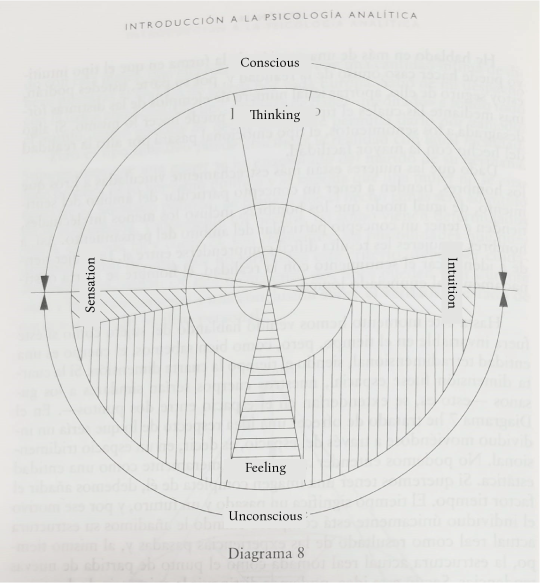
Source: Carl Jung, 1925. Notes of the Seminar on Analytical Psychology. XVI Session. Page 200. It’s in Spanish and I translated it, I don’t have the English version.
21 notes
·
View notes
Text
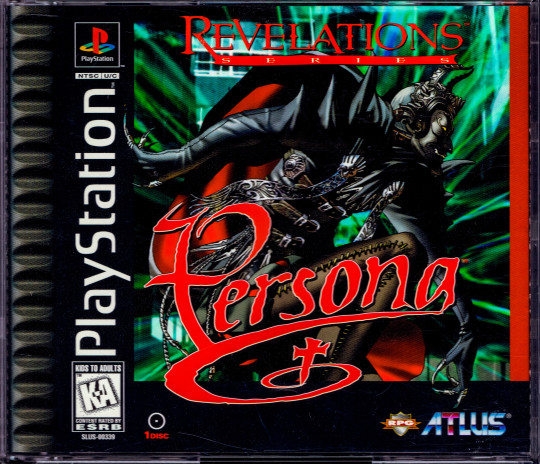
Analyzing ATLUS's first "Persona" draws on a range of philosophical disciplines, including existentialism, Jungian psychoanalysis, and theories of self and identity.
1. Jungian Psychology and the Concept of 'Persona':
"Persona" integrates Carl Jung’s psychoanalytic theories, particularly his concept of the 'Persona' – the mask or façade presented to the outside world, contrasted with the 'Shadow' – the unconscious, repressed aspects of the self. This aligns with Jung’s exploration of the psyche, comprising the ego, personal unconscious, and collective unconscious. The game prompts players to confront and integrate these disparate aspects of the self, a process Jung termed individuation, leading to a more complete and balanced psyche.
2. The Role of the Unconscious in Shaping Reality:
The game's emphasis on characters summoning different Personas, which are manifestations of their inner psyche, delves into the Jungian notion of the collective unconscious and archetypes. This collective unconscious is a reservoir of experiences shared by all humans, influencing and shaping individual experiences. The Personas, based on various archetypal figures and mythological beings, represent universal aspects of the human experience, pointing to a shared human heritage deeper than individual cultural contexts.
3. Nietzschean Perspectives on Power and Transformation:
Nietzsche’s philosophy, particularly his concept of the will to power and the idea of self-overcoming, is relevant to the characters’ journeys in "Persona." The game’s narrative arc, where characters confront and overcome personal and external challenges, echoes Nietzsche’s idea of life as a process of constant self-overcoming and transformation. The will to power manifests in how characters strive to assert their values and understandings in the world.
4. Existentialism and the Quest for Authenticity:
The existential themes of "Persona" resonate with the ideas of Jean-Paul Sartre and Martin Heidegger. The game explores the concept of existential authenticity, where characters are faced with situations that challenge their identity and beliefs, forcing them to make choices that define their essence. This aligns with Sartre’s notion that existence precedes essence and Heidegger’s idea of 'Being-toward-death,' emphasizing the importance of individual choice and responsibility in creating an authentic life.
5. The Concept of Alterity and the Other:
Emmanuel Levinas’ idea of 'alterity' or 'otherness' can be applied to the game’s exploration of the Other World and the characters’ interactions with entities therein. Levinas posited that encountering the Other is an essential part of the human experience, as it confronts individuals with perspectives and existences outside their own. In "Persona," this interaction with the Other forces characters to confront and reassess their own identities and beliefs.
6. The Dialectic of Self and Society:
Drawing on Hegel’s master-slave dialectic, "Persona" explores the dynamic relationship between self-identity and societal roles. The tension between characters’ personal desires and societal expectations reflects Hegel’s idea of self-consciousness being formed through recognition and conflict with the 'Other.' This philosophical theme underlines the struggle of the game's characters to assert their individuality within the constraints of societal norms.
In conclusion, "Persona" for the PlayStation 1 is a philosophically rich and complex game that engages deeply with Jungian psychoanalysis, existential themes, Nietzschean philosophy, the concept of alterity, and the dialectic of self and society. Through its narrative and gameplay mechanics, the game offers a profound exploration of the human psyche, the process of individuation, the quest for authenticity, and the intricate relationship between the individual and the collective. It stands as a thought-provoking exploration of the multifaceted nature of identity and the human condition.
4 notes
·
View notes
Text
The gift of 1s
1s excel at making the chaos of the unconscious into something structured and clear which people can understand, and then use as a framework to better their lives.
8s are the opposite of 1s. 8s excel at tearing down structure and/or escaping structure in order to plunge themselves into the unknown. The reason 8s become fixated on Lust where they struggle to feel like anything is ever enough, is because they are missing the Competency-based ability to create and form structure. All of the insight that 8s gain from their adventures and their fearless exploration of the chaotic underworld, end up wasted and meaningless, because the 8 cannot order any of it into a structure that makes any of it concrete and meaningful and lasting. The adventurousness and chaoticness of the 8 is even stronger in 7: the integration point of 1. Perhaps so many 1s envy 8s and mistype as 8s because they’re actually envying 7s, and it is a real bitch to tell 7s and 8s apart if you don’t understand typology deeply.
Unlike 8, 1 already has the ability and the motivation to create order and structure — it’s what they do. What fucks up the 1 is the emotional inability to stomach the ambiguity and chaos of life. Many 1s live chaotic lives, full of sex and drugs and parties. But what makes them 1s is that psychologically, they cannot handle the ambiguity of other people, the ambiguity of the human condition and human belief systems, the ambiguity of the psyche, the ambiguity of anything, without feeling ANGER and FRUSTRATION and a wealth of other intense emotions. The struggle for 1s is learning to get in touch with their shameful emotions of anger and frustration — and deeper down, their shame and sense of inadequacy. 1s feel they are somehow too inadequate inside to handle a chaotic life’s challenges, regardless of how untrue this is.
all the 1s I know have the “shamanistic” trait of 4. They are seeking to find what kind of person you really are — they envision the best, most perfect version of you, the way they envision the perfect version of themselves — and then try to help you to embody this version of yourself. 1 and 4 suffer from a problem where they can become too emotionally attached to abstract ideals about who everyone really is, including themselves. For example, the 1 might think you are a pianist deep down and become offended when this isn’t who you actually are deep down. This problem of idealizing people in hyper-specific, detailed archetypal ways originates from 4, and 1 inherits it from their disintegration line.
1s become fucked up when they refuse to embrace ambiguity, chaos, expansive thinking and subjectivity, each represented by one or both of their lines (1 -> 4) (1 -> 7). The belief systems and structures they form in attempt to seek meaning and give others meaning, turn out to be meaningless and reductive. 1s reduce reality to the five senses — the opposite of their original goal, which was to give mankind true meaning that allows him to expand his consciousness, 1 -> 7 — because they are filled with rage and anger and shame when forced to confront a more complex reality. I’m too tired to whip it out now but Modern Man in Search of a Soul by Carl Jung (he is a 1, btw!) has some excellent quotes which explain this phenomena, of religion becoming reductive and meaningless because the pastors (who are probably also 1s) are too scared to explore the chaotic and ambiguous unconscious full of fantasies.
1s are known for establishing and running religious institutions, because it is the calling of the 1 to provide meaning to other people’s lives.
#enneagram 1#type 1#enneagram#1w9#1w2#2w1#9w1#enneagram 8#7w8#8w7#8w9#9w8#enneagram 4#3w4#4w3#4w5#5w4
8 notes
·
View notes
Text
Plans on April
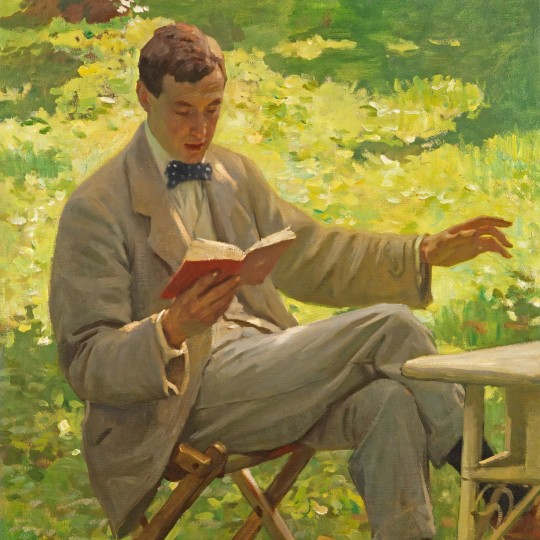
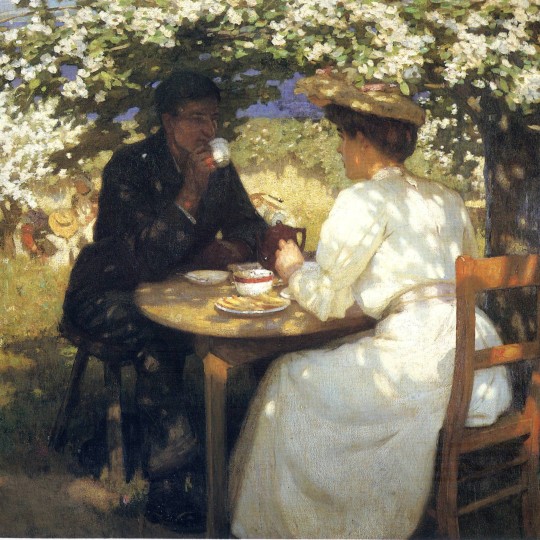
Life:
1. Operation
Books:
1. "Metamodernism. Historisity, Affect and Depth" by Robin van den Akker
2. "The Archetypes and the Collective Unconscious" by Carl Jung
3. "Tradition of Literary Gothic" by Bella Nacpock
Cinema:
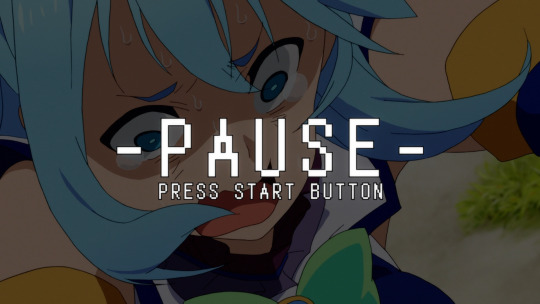
1. "KONOSUBA" by Natsume Akatsuki, Kurone Mishima,
Yuujirou Abe, Takaomi Kanasaki
2. "Only Yesterday" by Isao Takahata
3. "Ichi the Killer" by Takashi Miike
4. "Ampir V" by Victor Ginzburg
5. "All the Beauty and the Bloodshed" by Laura Poitras
6. "New Old Play" be Qiu Jiongjiong
7. "Benedetta" by Paul Verhoeven
Manga:
1. "Cells at Work! CODE BLACK" by Shigemitsu Harada, Akane Shimizu, Issei Hatsuyoshi
youtube
1 note
·
View note
Text
Your consciousness does not steer your body and behaviour,
it only ALTERS (CHANGE RATE, DIFFERENTIAL CALCULUS) your otherwise predictable flow of body, behaviour, habits & reactionary pattern FORMED by the CONTENTS (INTEGRAL CALCULUS) of your unconscious mind (intuition Gary Klein, adam ALTER drunk tank pink).
That is why when you drive a bike or a car for the first time it is so difficult, but after some time you do not think about it anymore, it then happens unconsciously as the process of learning to DIFFERENTIATE psychological triggers and symbols has been INTEGRATED into your unconscious contents.
The learning process is fundamentally driven by mistakes and failures
("prediction errors" as explained by Free Energy Principle by Karl Friston)
being IRONY because differential (superego) & integral (ID) calculus are an IRONIC PROCESS to each other: ego functions.
Similarly, both
our collective cultural evolution (mimetic theory rene girard) since dawn of mammal brain (emotional projections upon shared symbols)
and your individual whole perceptions of reality since birth
are formed this way:
spiral dynamics as explored by
🔍Adult Development Robert Kegan
and 🔍9 stages of increasing ego development by Susanne R Cook-Greuter
and 🔍DTF and CDF by Otto Laske.
EVERYHING in your mind is nothing but constructed (mythos) and does NOT equal objective reality (causation) which you NEVER interact with directly, only through subjective biased "Interface of Perception Donald D Hoffmann" which you constantly modify via Leibnizian calculus which we as culture exchange to modify collective functionality:
Monadologie of Leibniz = Archetypes by Carl Jung
exchanged via mimetic repressions.
Psychosis means getting lost in reductionistic DIFFERENTIATION without (self)ironic INTEGRATION.
You do not need to understand mathematics to understand these fundamental relations.
A 4 year old child would understand what is explained here if explained in context of their personal trial & errors of deepest troubles and hardships, and, opposed to colonial master-slave robot school system, it would actually spark their INTRINSIC interest to learn ... not just mathematics.

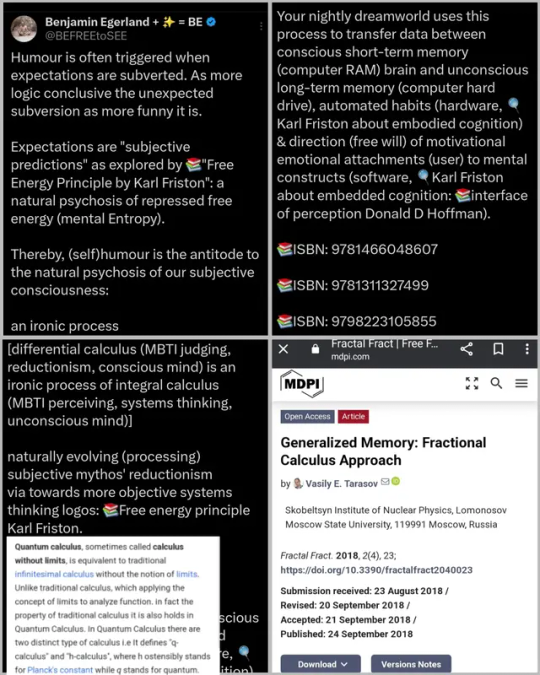
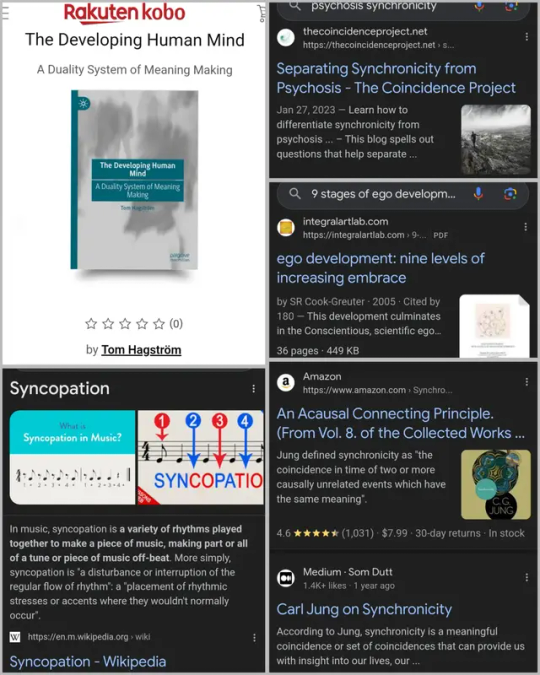
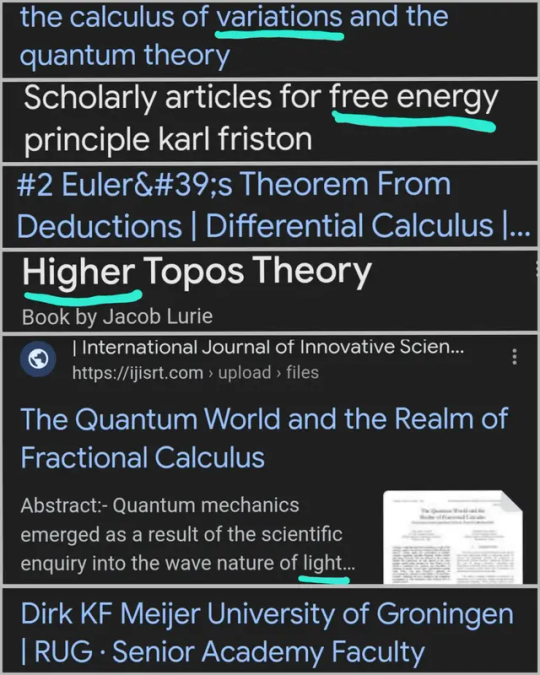
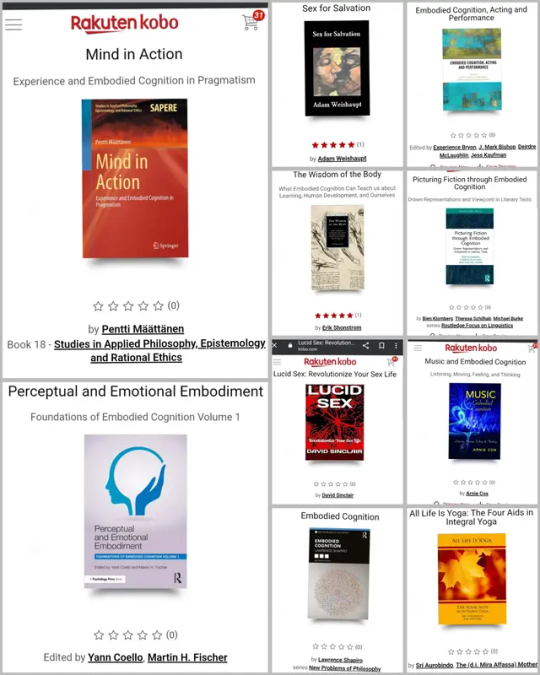

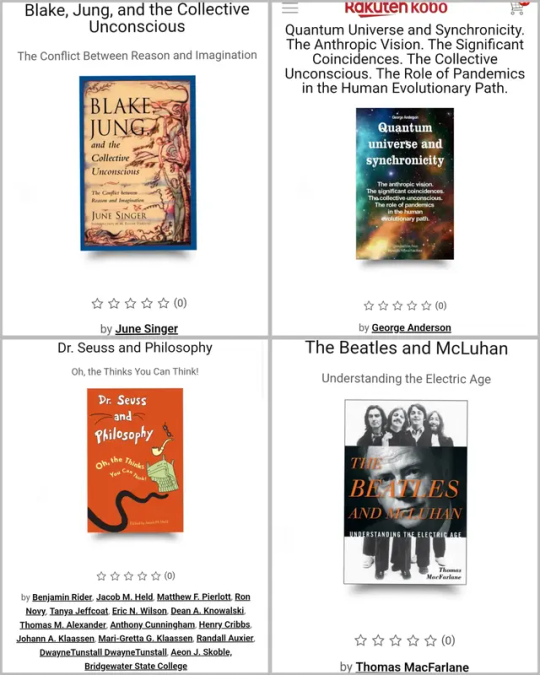

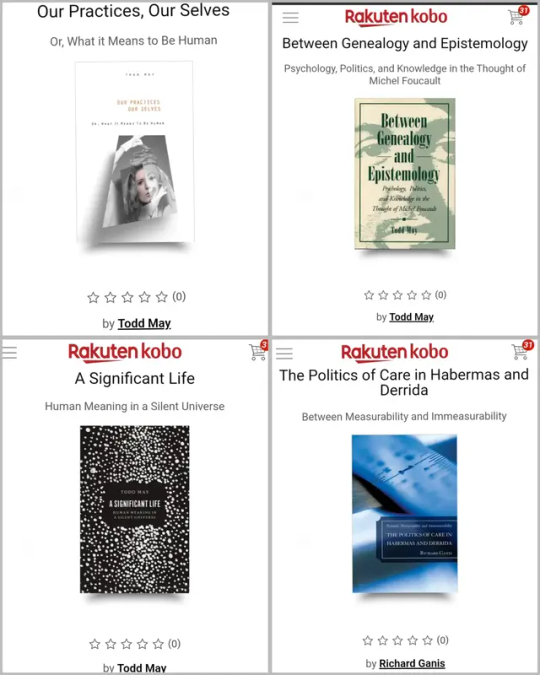
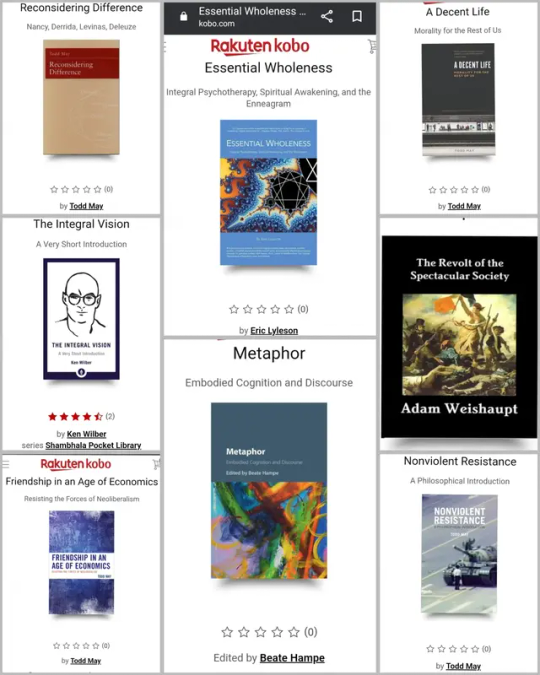
0 notes
Text
Brand Archetypes Research Task
Brand Archetypes are a psychoanalytical concept derived from the original personality types. They play a role in influencing our behaviour on a subconscious level, leading to typical behavioural patterns, desires, values and motivations all driven by a single dominant goal. In terms of advertising, this refers to what style and content is present within an advert which shall appeal most to a specific personality type.
These Brand archetypes were conceptualised by Swiss Psychologist Carl Jung (1875-1961).
(3)
youtube
IKEA - EVERYMAN
The advert is directed towards families and family living, which essentially relates most to the everyman archetype as it appeals to our wanting to belong and connect with others.
youtube
John Lewis - CAREGIVER
This advert relates most to the caregiver archetype as it symbolises the importance of family and friendship especially during Christmas time.
youtube
NIKE - THE HERO
This advert appeals most to people who want to aspire to be greater version of themselves, in this case in sport and the positive impact it has on someones life. This type of mastery over a certain aspect of someones life means the ad appeals most to the hero archetype.
4. I would say that I am the outlaw archetype, meaning that adverts by companies such as MTV, Harley Davidson and Levis likely have ads that will appeal most to me.
5. I say this because I like to think of myself as a unique individual that likes to stand out a lot of the time when compared to others, I value my freedom of expression which is what is being advertised in the ads created by these companies.
0 notes
Text
Jaune The Maid

Jaune alludes to Joan of Arc , who is famous for hearing the voices of the angels, for leading her people towards victory and for dying as a martyr.
So far, this allusion has not played a major role and its references have mostly been easter eggs in volume 1 throughout the Jaunidice's arc. However, I will argue that the set-up is here for it to be perfectly integrated into Jaune's arc. Not only that, but it can easily become the thematic heart of his story.
JAUNE- A JOURNEY THROUGH THE ANIMA
The anima is the archetype of the life itself. (“Archetypes of the Collective Unconscious,” Carl Jung)
According to Jung, the anima is "the inner feminine side of a man". I prefer to define it as one's "opposite self" aka an archetype made of traits we (think we) lack and so look for in a partner. In literature, the anima is used to develop romantic relationships. A character ends up with someone, who complements them and brings out qualities they initially haven't.
Whatever the definition you prefer, the idea of anima is the crux of Jaune's arc. He starts the series as a slave to toxic masculinity:
Jaune: I don’t want help! I don’t want to be the damsel in distress! I want to be the hero!
Still, thanks to Pyrrha's influence he moves past that and starts embracing his "feminine side" more:

This is Jaune's story in a nutshell. He is a boy, who wants to be a hero, but discovers that to become one, he must accept he is a damsel as well.
In general, the Vale arc sets up a gap between Pyrrha, Jaune and their approaches to heroism.
On the one hand Jaune wants to become a hero to run away from who he is:
Jaune: Cause this is always what I’ve wanted to be! My father, my grandfather, and his father before him were all warriors! They were all heroes! I wanted to be one, too. I was just never good enough.
This is why he symbolically enters Beacon through cheating. He acts as someone he is not.
On the other hand Pyrrha is a hero simply because that is the person she wants and chooses to be:
Red-Haired Woman: I don’t think she would regret her choice, because a Huntress would understand that there really wasn’t a choice to make. And a Huntress is what she always wanted to be.
The choice between being a hero and being herself is never really a choice because being a Huntress is a part of who Pyrrha is. So, her final sacrifice is not really a negation of the self, but a result of who she deep down is.
Since Beacon, Jaune has been struggling to overcome this gap by following into Pyrrha's footsteps.
He keeps integrating with her both physically:
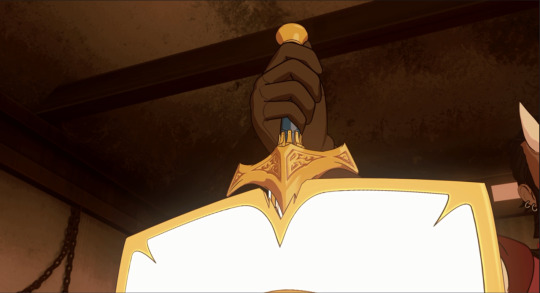
Blacksmith: That was some fine metal you brought me. Accents the white nicely. Where’d you get it from?
And spiritually:

Jaune: No. I don’t think I’m healing her. Our Aura heals our bodies. It feels… it feels more like I’m using my Aura to amplify hers!
Nora: Wait, aren’t you worried about running out?
Jaune: Pyrrha once told me I’ve got a lot of it. I still believe her.
This integration leads him to grow, but also forces him to fight the same foes (Cinder) and to face the same challenges and pain (killing Penny). In this way, Jaune is slowly becoming more like Pyrrha and he is acquiring the feminine traits he initially refuses. In other words, he is integrating with his own anima.
This process symbolically goes through 4 phases, known as the Four Stages of the Anima:
Jung distinguished four broad stages of the anima, analogous to levels of the Eros cult described in the late classical period. He personified them as Eve, Helen, Mary and Sophia. [“The Psychology of the Transference,” CW 16, par. 361. ]
Pyrrha is for Jaune the personification of 3 of these stages:
1-"In the first stage, Eve, the anima is indistinguishable from the personal mother. The man cannot function well without a close tie to a woman".
Jaune: Bring it on, Ice Queen! I'll have you know that I have been told that I am a natural born leader!
Weiss: By who? Your mother?
Jaune: A-and Pyrrha!
2-"In the second stage, personified in the historical figure of Helen of Troy, the anima is a collective and ideal sexual image" (“All is dross that is not Helen” – Marlowe).

3-"The third stage, Mary, manifests in religious feelings and a capacity for lasting relationships."
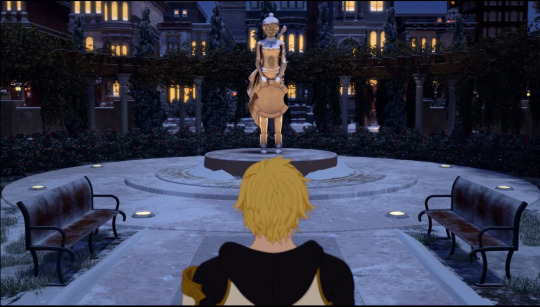
Some people fall in love for life
Others never get it right
Love's fickle when it calls
One thing that I know for sure
Longer than our lives endure
You're my forever fall
This means that even if she is dead, Pyrrha keeps being a key character for Jaune and a big part of his life:
Pyrrha: I want you to know that I’m just happy to be a part of your life. I’ll always be here for you, Jaune.
JAUNE'S ANGEL
Jaune: She should be standing here...
Red-Haired Woman: She is.
Pyrrha will always be at Jaune's side, even if just as an inner voice to guide him. After all, isn't Joan of Arc inspired in her quest by the voices of the angels?
Well, Pyrrha is Jaune's personal angel. Her sacrifice and example guide him throughout his journey. This is why the scene in Lost is so ethereal and yet needs no more elaboration.
Who is the Red Haired Woman? Is she Pyrrha's mother? Is she a manifestation of Pyrrha herself? Is she real? Is she a vision? It does not matter. Thematically, she is Jaune's inner self, that part of him who is forever bonded to Pyrrha (aka his anima :P). She appears to once again guide him and inspire him to be the best possible version of himself.
Pyrrha keeps living through Jaune, who is her legacy and this is why she keeps standing:
Nora: Pyrrha may not be by our side anymore, but we can fight like she is.
Jaune: And in a way... she will be.
4 DEATHS- 4 GIFTS
Pyrrha is Jaune's anima and his inner guide, but where exactly is she leading him? The answer is towards self-actualization. In RWBY this happens through the 4 gifts of the Gods:
Pyrrha: It’s not about why; it’s about knowing. Understanding dark and light helps us manifest our Aura. Everyone has some of both.
All the characters are going through Knowledge, Creation, Destruction and Choice in different ways. When it comes to Jaune, his journey is articulated through the 4 alchemical deaths:
Jaune’s arc is about living Pyrrha’s death over and over again with different scenarios and outcomes. This happens so that in the end he can finally overcome it.
So far, it has happened three times and each time has been in the climax of an important battle.
The Battle of Beacon has him witness powerlessly to Pyrrha’s death (lack of knowledge and passivity).
The Battle of Haven has him saving Weiss (creation).
The Battle of Atlas has him killing Penny (destruction).
What is more, every time Jaune becomes more proactive and conscious of what he is doing.
In Beacon he has no idea of what is happening. He works with little information and things happen to him without him being able to do anything.
In Haven his actions lead to Weiss being in danger, but he manages to save her. That said, he does not do it consciously. He unlocks his Semblance because of emotional stress. It is an unconscious choice and not a conscious one.
In Atlas he makes a specific conscious choice, but it is a choice that is forced on him because of external circumstances. It is also a choice that is meant to challenge and temporally break him.
Every death do far has symbolized one of the gifts. Pyrrha (Knowledge), Weiss (Creation), Penny (Destruction). By going through them he is painfully understanding the Cycle of Life Death and his role in it as well. This fits a character whose main motivation is grief and whose allusion is intertwined with the idea of martyrdom. Jaune is specifically the character that I think will deconstruct/invert this idea. Joan of Arc dies a martyr, while Jaune has to go through others' martyrdoms over and over. He must understand them, accept them and move forward despite the pain.
So, 3 gifts/deaths out and 1 to go. This last death has to be about Choice. Jaune's stance on it needs to convey he has understood the theme fully and that he is choosing who he wants to be. There is only 1 character that can challenge him to choose between Creation and Destruction and who has been a constant in all the climatic deaths so far:

Cinder is the perpetrator of each death and the one who has been hurting Jaune (and all the others) personally and cruelly. She is also the Maiden of Choice and if she wants her arc to have any kind of positive resolution she must fully understand this idea. Only in this way she can become fit enough to embody it.
However, as for now, she is far far far away from it. She has been ignoring her insecurities and pushing away any chance of positive development. So, can she still grow into a true Maiden? And how does Jaune figure in all of this?
MAIDENS AT HEART
Winter: No, Penny. You were always the real Maiden at heart.
Each arc has so far had 2 Maidens. The first is the titular Maiden, who can create tornados and has flaming eyes. The second is the Maiden at heart, who even without powers understands the theme and what being a Maiden truly means.
Raven and Yang are the 2 Maidens of Knowledge, while Winter and Penny are the 2 Maidens of Creation. Symbolically, they meet in front of a vault at the climax of an arc and the Maiden at heart shows the other who they should aim to become. What is more, usually this meeting calls back an early interaction between the 2 same characters.
Here it's what happens between Yang and Raven:
Yang: Oh, shut up!! You don't know the first thing about strength! You turn your back on people, you run away when things get too hard, you put others in harm's way instead of yourself!! You might be powerful, but that doesn't make you strong.
Raven: Who do you think you are, lecturing me?! Standing there, shaking like a scared little girl?!
Yang: Yeah, I'm scared. But I'm still standing here!
Here comes instead the Winter and Penny's interaction:
Winter: I was just a machine… just… following orders.
Penny: You were my friend.
Winter: Thank you… for trusting me with this. When you’re… gone…
Penny: I won’t be gone, I’ll be part of you.
Yang shows Raven what being strong and smart really looks like. She also proves to her that knowledge does not need to be a cage preventing you from doing the right thing. Their whole conversation in front of the vault also mirrors their previous interaction in the camp. There Raven tries to lecture and to teach Yang, while here she proves to her mother she is already a better person than her.
Penny assures Winter about her humanity and through her sacrifice she affirms the themes of friendship and trust. After having been cared and taught by Winter, she is finally paying the favor back, as shown by her repeating Winter's words about not really being gone verbatim.
So, what about Cinder and Choice? Obviously Cinder's Maiden at heart is Pyrrha.
CINDER AND PYRRHA'S FAILED COMMUNICATION
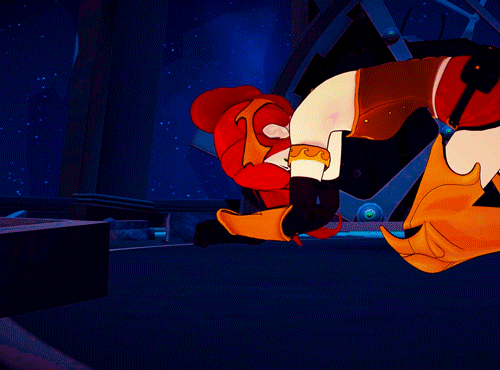
Pyrrha: Do you believe in destiny?
Cinder: Yes.
Like the other couples of Maidens, Cinder and Pyrrha meet during the climax of an arc and the Maiden at heart tries to teach the titular Maiden an important truth.
The problem is that Cinder kills Pyrrha before she can fully express what Choice and Destiny are really about. So, in a sense, here Pyrrha fails at communication. This is kind of the main struggle of her arc:
Pyrrha: Tell her exactly what you said. No ridiculous schemes, no pick-up lines. Just... be honest.
Jaune: But what if I-
Pyrrha: Jaune. You can't get it wrong if it's the truth.
Jaune: You're right. Thanks, Pyrrha! Good talk, Ren!
Nora: Practice what you preach, Pyrrha.
What goes in the way of her relationship with Jaune is on her part the inability to fully express what she feels. Moreover, Pyrrha's link to the idea of communication is shown also through 2 other details:
Her weapons - Milò (her spear) and Akuou (her shield) mean respectively to talk and to listen. One needs to both attack and defend to be a balanced fighter. Similarly, one needs to both talk and listen to be in a balanced relationship and to communicate effectively.
The setting of her fight with Cinder - Pyrrha and Cinder's fight happens on the top of Beacon Tower aka a Communication Tower. Pyrrha's sacrifice is born specifically by the necessity to stop the tower from falling, so that communication among countries can be maintained.
Pyrrha loses her weapons in the fight, just like the tower falls and world communication is lost. So, it is really not surprising that even her attempt to get through Cinder fails.
Cinder herself refuses to listen to others and symbolically she is once again the one who gets in the way of World Communication in volume 8, where she damages Amity and refuses Penny's attempt to understand her:
Penny: Why are you doing this? Why serve someone like Salem?
Cinder: I don’t serve anyone. And you wouldn’t either, if you weren't built that way.
So, Pyrrha doesn't manage to reveal her truth to Cinder, who on her part stubbornly keeps closing herself up to others. Still, before the end Cinder needs to learn Pyrrha's lesson.
Luckily, Pyrrha might have failed with Cinder, but her struggle to open up and to grow close to Jaune has resulted in her successfully passing on her teaching to him:
Pyrrha: Do you believe in destiny?
Jaune: Um... I-I don't know. I guess that depends on how you view it.
Pyrrha: When I think of destiny, I don't think of a predetermined fate you can't escape. But rather... some sort of final goal, something you work towards your entire life.
BECOMING A TRUE MAIDEN
To summarize, here is the situation:
Cinder still remembers Pyrrha's words, but she does not understand their meaning
Pyrrha has died apparently for nothing since she could not convey the truth to Cinder
Jaune needs to fully integrate with Pyrrha, his anima, so that he can reach self-actualization and become a true hero like her
There is a very simple way these plotlines and arcs can all come together and that is if Jaune himself becomes Cinder's Maiden at heart. He can be the one showing Cinder what Choice and Maidenhood truly are. It can happen in a scene that mirrors Cinder/Pyrrha, Cinder/Jaune and Pyrrha/Jaune's past interactions.
It would be a meaningful way for Cinder to finally become a true Maiden and to make a defining self-actualizing Choice. This choice will lead to Cinder's death (the 4th and final alchemical death), but will also save the world.
It would give additional meaning to Pyrrha's story by making her instrumental in saving the world, not because of her prowess as a fighter, but through her relationship with Jaune. In the end, her major contribution would be thanks to that young love which was cut short by her premature death and that nobody of the People in ChargeTM considered as important.
Finally, for the story to make Jaune symbolically a "Maiden" would be a fitting crowning moment for his arc. The childish boy who wanted to be a hero and a knight so badly finally realizes his dream... by turning into a sensible and wise Maiden. It would show clearly he has fully integratred with his feminine traits (Pyrrha, his anima) and would pay a neat homage to his allusion.
I mean, isn't Joan of Arc famous as the Maid of Orleans?
59 notes
·
View notes
Text
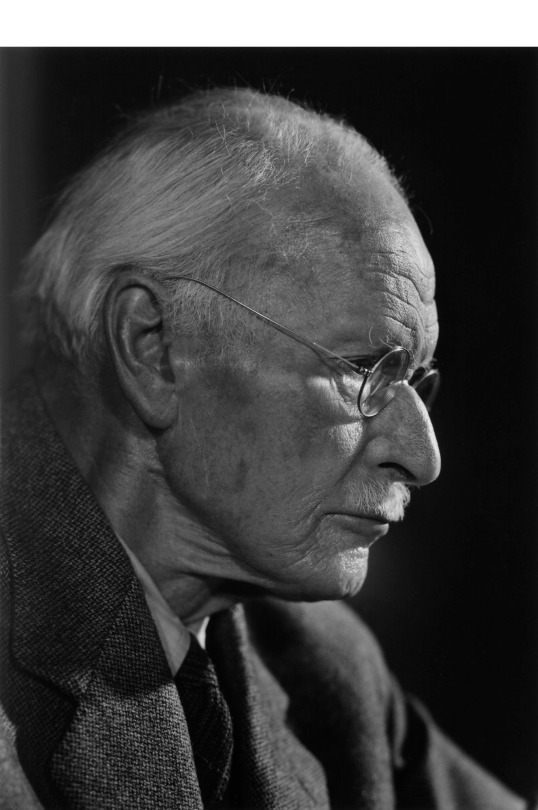
Carl Jung’s Insights
Applied to Cooking
1. "The journey to becoming a master chef begins by exploring the depths of your culinary subconscious."
2. "In the realm of flavors and tastes, lies the key to unlocking the mysteries of creating unforgettable dishes."
3. "Integration of different cooking techniques is essential for achieving balance and harmony in your culinary creations."
4. "Ingredients and spices are the language of gastronomy, providing insights into the depths of culinary artistry."
5. "The process of culinary individuation is the path towards expressing your unique culinary identity."
6. "Denying our cravings and passions only leads to their unconscious manifestation in unhealthy eating habits."
7. "Culinary archetypes are the ancient patterns of taste and presentation that influence our culinary choices."
8. "Culinary mythology serves as a guide for understanding the archetypal flavors and techniques that shape our culinary experiences."
9. "The concept of synchronistic flavors suggests that culinary combinations are not random but reflect the underlying interconnectedness of different dishes."
10. "By embracing new ingredients and techniques, we invite transformation and growth into our culinary endeavors."
#carl jung#cooking#food#food philosophy#at the table#nutritional health#homecooking#foodinspiration#sustenance
0 notes
Text
Journal Reflection 4: Interpreting Picasso’s Mintauromachy in a Psychoanalytic Context - Part 1
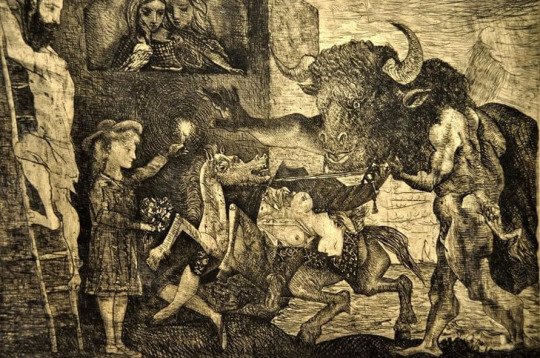
The following is a psychoanalytic interpretation of Picasso’s Mintauromachy based on the Jungian archetypes, although first an exploration into these concepts of psychoanalysis and the Jungian archetypes that go hand in hand with one another. Psychoanalysis was established by Sigmund Freud in the early 1890s and the studies of psychoanalysis established that art helps further understand an individual’s psyche to root deeper meanings in their subconscious and to root them out.
Furthermore, these studies developed a psychoanalytic methodology in terms of art to better understand an artist or individuals following such a practice, and these can be divided into three often overlapping categories; psychobiography which is the study of the artist’s life especially when it’s influential to their work; psycho-iconography that is evident in the use of conventional symbolism but interpreted with the artist’s motivation in mind; and the origin of creativity related to the artistic process and how various choices influenced the artist’s making process.
Looking into Carl Jung’s archetypes they’re universal symbols present in all human’s collective unconscious, that could be innate or inherited, constantly shaping our thoughts, feelings and behaviors. Jung believed that by understanding such archetypes we could gain a closer insight into the human psyche and a better understanding of ourselves, the main Jungian archetypes are:
The persona which is an identity that individuals project to others, that is different from their inner self and can be influenced by the thinking of social roles in society or created through the collective unconscious archetypes; the shadow that consists of behavior aspects of one’s self that he sees as negative, this results due to a source of shame or stress and individuals would feel the need to conceal it; the animus or anima depicts another gender to one’s self, such as when someone builds a gender identity they might feel the need to repress the attributes of their personality that could be associated with the opposite gender, these archetypes represent the masculine and feminine qualities that exist within every person, regardless of gender; the self indicates the unified consciousness and unconsciousness of a person, that according to Jung the conflicts of both of these aspects may result in psychological troubles that could cause disharmony into knowledge and accommodating in conscious understanding that is important for the process of individuation.
0 notes
Text
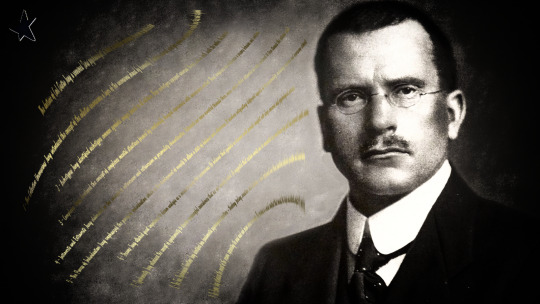
The doctrine of Carl Gustav Jung
The doctrine of Carl Gustav Jung, a renowned Swiss psychoanalyst, is known as analytical psychology. Here are some key points of his doctrine:
1 - The Collective Unconscious: Jung introduced the concept of the collective unconscious, a layer of the unconscious shared by humanity. It contains universal archetypes, symbols, and motifs found in myths, fairy tales, and religions.
2 - Archetypes: Jung identified archetypes, common symbolic images found in all cultures. These archetypes represent universal themes such as birth, death, the mother, the hero, etc.
3 - Complexes: Jung developed the concept of complexes, mental structures formed by emotionally charged experiences with unconscious content. These complexes can influence a person's behavior and reactions.
4 - Introverts and Extraverts: Jung elaborated on the concepts of introversion and extraversion as personality characteristics. Introverts are more oriented towards their inner world, while extraverts are more inclined to turn towards the external world.
5 - The Process of Individuation: Jung emphasized the process of individuation, which is the development of oneself to attain a state of balance and wholeness. It involves integrating different aspects of the personality, including conscious and unconscious elements.
6 - Dreams: Jung attached great importance to dream analysis as a means to access the unconscious. He believed that symbols in dreams could provide insight into deep concerns and psychological processes.
7 - Synchronicity: Jung introduced the concept of synchronicity to describe meaningful coincidences that are not causally linked. He suggested that certain events can be connected in a non-linear way and have personal or symbolic meaning.
8 - The Four Psychological Functions: Jung identified four fundamental psychological functions – thinking, feeling, sensation, and intuition – and explained how these functions influence perception and decision-making.
9 - The Persona: Jung introduced the concept of the "persona," representing the social mask each person wears in society. The persona is a social construct that conceals the deeper and authentic aspects of the personality.
Picture of CGJ
illustration by Laurent Guidali
Www.Etoile.App
0 notes
Text
Shadow Work Sunday is something I've decided to start to give you aid with your healing journey. You don't need to answer anything thru a comment, but the information I'll be sharing with you may be something you may want to save or write down to help you along. Shadow work isn't easy stuff. We're acknowledging hidden facets about ourselves that we've suppressed or stored away to deal with at another time. Whether this is consciously or subconsciously, these suppressed emotions play a huge role in our day to day lives. Peeling ourselves apart like an onion will no doubt make you confront things that happened throughout your life that need to be dealt with. Especially if you're looking to step into your true self and integrate your dark and light sides. Tapping into your psyche and facing the things you've been avoiding or suppressing is a personal journey I urge you to take, especially if you've been through some kind of trauma. Shadow work will help you transcend toward a path of self-discovery, self-restoration, self-empowerment, and healing. Getting yourself a notebook, diary, or journal is something you're gonna need for this, along with some time to yourself so you can focus and face the depths of the emotions.
This can be really beneficial if you either can't afford a therapist or don't feel comfortable talking with someone.
A self-exploration and healing path is a journey and an awakening! This isn't easy work, but it's necessary if you're trying to step into your true self and move forward in a healthy way. As Carl Jung stated, "When we avoid our shadow, it thrives in the shadows, capable of undermining and sabotaging our lives."
Whether this is suppressed or repressed, these things can deteriorate us from the inside out. Denying any of these emotions or traumas only preserves and eternalizes our suffering.
Courage and self-acceptance are needed here. As well as empathy and forgiveness to yourself. Please don't forget that. Jung was the father of shadow work. He coined the word himself, and thru working with archetypes, he was able to recognize that our shadow and our light were linked.
This journey involves;
1. Meeting your shadow.
2. Integrating your feminine and masculine energies.
3. Transcending your ego.
4. Emerging as your true self.
Creating a safe space and journaling will allow you to process those emotions that will trigger you and let you reflect back on this journey. Reflection to questions in your shadow journal is highly recommended and pertinent to fully integrating, transcending, and transforming. It's a great place to jot down any dreams that seem to trigger emotions within you. Again, I remind you to be kind to yourself, show yourself empathy, forgive yourself, and embrace your transformation.
Learning grounding techniques ahead of time will be helpful for this process. Breath work, sound baths, meditation, affirmations, and EFT( aka tapping) can all be powerful tools for this psychological process with extraordinary benefits!
Journal prompts to begin with:
1. Reflect on a positive childhood memory that makes you happy and brings a smile to your face. How did you feel during that moment? How can that happiness from that moment bring an influence into your current perspective?
2. Now imagine you as a child standing in front of the current you. What does your inner child need to hear to feel safe, loved, and valued?
3. Stepping into your inner child once again. How does it feel being provided those words and guidance? How can you create a sense of safety and comfort for your younger self?
#shadowworkchallenge
#shadowwork #Jung #InnerHealing #InnerStrengthJourney
#TaurusSoulAstrology
0 notes
Text
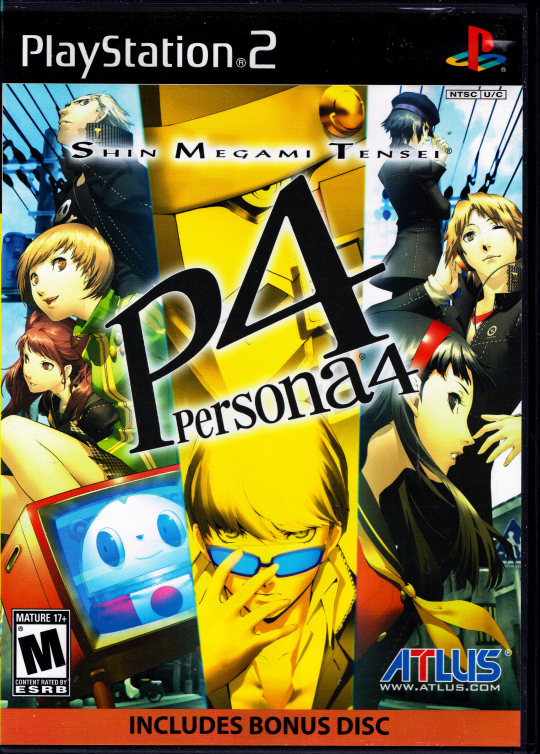
Analyzing "Persona 4" for the PlayStation 2 requires an intricate exploration of existentialist, psychoanalytic, and metaphysical philosophies.
1. The Quest for Identity and the Jungian Self:
"Persona 4" immerses players in a journey of self-discovery, central to which is the concept of identity. The game’s exploration of characters' multiple selves, including their Personas, resonates deeply with Carl Jung’s psychoanalytic theory. Jung’s ideas about the Persona (the social face the individual presents to the world), the Shadow (the unconscious aspect of the personality which the conscious ego does not identify in itself), and the process of individuation (the integration of these aspects into a well-functioning whole) are vividly portrayed in the game. Each character’s struggle to accept their Shadow and integrate it, thus achieving a fuller understanding of their self, mirrors Jung’s process of individuation, highlighting the complex nature of identity.
2. Confrontation with Death and Existentialism:
The recurring theme of death in "Persona 4", embodied in the mysterious murders and the characters' journeys through the shadowy Other World, invites an existential analysis. Philosophers like Martin Heidegger and Jean-Paul Sartre, who emphasized the importance of confronting one's mortality as a way to live authentically, find echoes in this game. The characters' encounters with death force them to confront their mortality, an existential realization that propels them toward self-realization and authenticity, in line with Heidegger’s concept of 'Being-toward-death'.
3. Transformation and Metamorphosis:
The transformation of characters in "Persona 4" is not just physical but also deeply metaphysical and psychological. This metamorphosis can be viewed through the lens of Friedrich Nietzsche’s philosophy of self-overcoming and the creation of the Übermensch (overman), a goal for humanity to set for itself. The characters in "Persona 4" go through a Nietzschean process of self-overcoming, transcending their previous limitations and fears to reach a higher state of being.
4. The Shadow and Freudian Psychoanalysis:
The concept of the Shadow in "Persona 4" also aligns with Sigmund Freud’s theory of the unconscious. Freud’s ideas about repressed desires and fears manifesting in various ways are central to the game’s narrative. Each character’s confrontation with their Shadow can be seen as a Freudian journey into the unconscious mind, facing hidden fears, desires, and aspects of their identity that have been suppressed.
5. The Collective Unconscious and Shared Myths:
The game’s use of various mythological and historical figures for Personas taps into Jung’s concept of the collective unconscious. This shared reservoir of experiences, Jung theorized, contains archetypes common to all human beings. "Persona 4" uses these archetypes to explore universal themes of human experience, thus delving into the philosophical idea that there are shared elements in the human psyche transcending individual experiences.
6. Personal Responsibility and Sartre’s Existential Freedom:
The theme of personal responsibility in "Persona 4" is reminiscent of Jean-Paul Sartre’s existentialist philosophy. Sartre’s idea that existence precedes essence, and the emphasis on personal responsibility and freedom in defining oneself, is reflected in the characters' journey. They are not only responsible for confronting and integrating their Shadows but also for the choices they make in defining their identities.
In conclusion, "Persona 4" presents a complex and rich philosophical narrative. Through its exploration of identity, death, and transformation, the game engages deeply with Jungian psychoanalysis, existentialist philosophy, Freudian psychoanalysis, and the idea of the collective unconscious. It challenges players to contemplate the multifaceted nature of the self, the existential reality of death, and the transformative journey of self-discovery and self-creation. The game stands as a profound interactive exploration of some of the most fundamental philosophical questions concerning human existence and identity.
6 notes
·
View notes